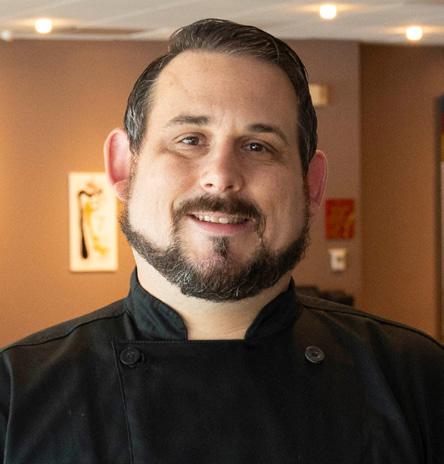STATE OF DECAY

ARKANSAS RANKS LAST IN DENTAL HEALTH (AND IT HURTS OUR FILLINGS)
BY STEPHANIE SMITTLE










ARKANSAS RANKS LAST IN DENTAL HEALTH (AND IT HURTS OUR FILLINGS)
BY STEPHANIE SMITTLE








30 LADY WISDOM
Five veterans in the war for abortion rights say it's time to change up the battle plan. By Debra Hale-Shelton
36 GAPS IN CARE
A rotten state of affairs in Arkansas dental care. By Stephanie Smittle
From the Farm: Raising rabbits for protein and profit.
Aw, Snap: Much Aidoo about the Hogs.
Q&A: State Rep. Diana Gonzales Worthen scores a rare win for Democrats.
Big Pic: An underground escape hatch at the state Capitol costs $3.6 million.
Zee Zee plays Liszt at Robinson Center, Randy Travis at Robinson Center, Miss Gay America Pageant comes to town, the Persistence of Vision Film Festival in Hot Springs, and more.
24 NEWS & POLITICS INSURANCE ON THE LINE
Medicaid expansion at risk for thousands. By Benjamin Hardy TAKEN FOR A RIDE LEARNS vouchers for horse girls. By Benjamin Hardy
42 CULTURE
Mucking around with Gar Hole Records. By Daniel Ford
48 FOOD & DRINK
A savory survey of some of Little Rock’s tastiest soups. By Rhett Brinkley
54 CANNABIZ
Smoking out the latest in truck-stop cannabis. By Matt McNair
58 THE OBSERVER
Honoring our loyal and long-suffering commenters on the daily Open Line.
ON THE COVER: Arkansas ranks last in the nation in dental health. Fixing the problem won't be easy. (Lu.stock.adobe.com)














PUBLISHER Alan Leveritt
EDITOR-IN-CHIEF Austin Gelder
CREATIVE DIRECTOR Mandy Keener
MANAGING EDITOR Benjamin Hardy
PRINT EDITOR Dan Marsh
FOOD EDITOR Rhett Brinkley
CANNABIZ EDITOR Griffin Coop
DAILY EDITOR Lara Farrar
CULTURE EDITOR Daniel Grear
INVESTIGATIVE REPORTER Matt Campbell
AGRI AND ENVIRONMENT REPORTER Phillip Powell REPORTER Milo Strain
VIBE CHECKER Stephanie Smittle
EDITOR EMERITUS Max Brantley
CONTRIBUTING EDITOR Mara Leveritt
PHOTOGRAPHER Brian Chilson
DIGITAL MARKETING MANAGER Madeline Chosich
DIRECTOR OF DEVELOPMENT Wythe Walker
ADVERTISING ART DIRECTOR Mike Spain
GRAPHIC DESIGNER Katie Hassell
DIRECTOR OF ADVERTISING/ SPECIAL PUBLICATIONS PUBLISHER Brooke Wallace
ACCOUNT EXECUTIVES
Terrell Jacob, Kaitlyn Looney, Evan Ethridge and Mechelle Winslow
ADVERTISING TRAFFIC MANAGER Roland R. Gladden
SPECIAL SECTION MANAGING EDITOR Caleb Patton EVENTS DIRECTOR Donavan Suitt
DIRECTOR OF CANNABIS SALES AND MARKETING Lee Major IT DIRECTOR Robert Curfman
CIRCULATION DIRECTOR Anitra Lovelace
CONTROLLER Weldon Wilson
BILLING/COLLECTIONS Charlotte Key
CHAIR MAN Lindsey Millar
PRODUCTION MANAGER Ira Hocut (1954-2009)





ARKANSAS TIMES (ISSN 0164-6273) is published each month by Arkansas Times Limited Partnership, 201 East Markham Street, Suite 200, Little Rock, Arkansas, 72201, phone (501) 375-2985. Periodical postage paid at Little Rock, Arkansas, and additional mailing offices. POSTMASTER: Send address changes to ARKANSAS TIMES, 201 EAST MARKHAM STREET, SUITE 200, Little Rock, AR, 72201. Subscription prices are $60 for one year. For subscriber service call (501) 375-2985. Current single-copy price is $5, free in Pulaski County. Single issues are available by mail at $5.00 each, postage paid. Payment must accompany all orders. Reproduction or use in whole or in part of the contents without the written consent of the publishers is prohibited. Manuscripts and artwork will not be returned or acknowledged unless sufficient return postage and a self-addressed stamped envelope are included. All materials are handled with due care; however, the publisher assumes no responsibility for care and safe return of unsolicited materials. All letters sent to ARKANSAS TIMES will be treated as intended for publication and are subject to ARKANSAS TIMES’ unrestricted right to edit or to comment editorially. ©2024 ARKANSAS TIMES LIMITED PARTNERSHIP



Experience Dogwood Canyon’s new Guided Winter Watch Tour! Enjoy a cozy enclosed shuttle ride through the canyon with chances to spot bald eagles, bison, elk, and more — perfect for nature lovers and photographers alike.
Dogwood Canyon Nature Park is proudly part of the Johnny Morris Conservation Foundation.

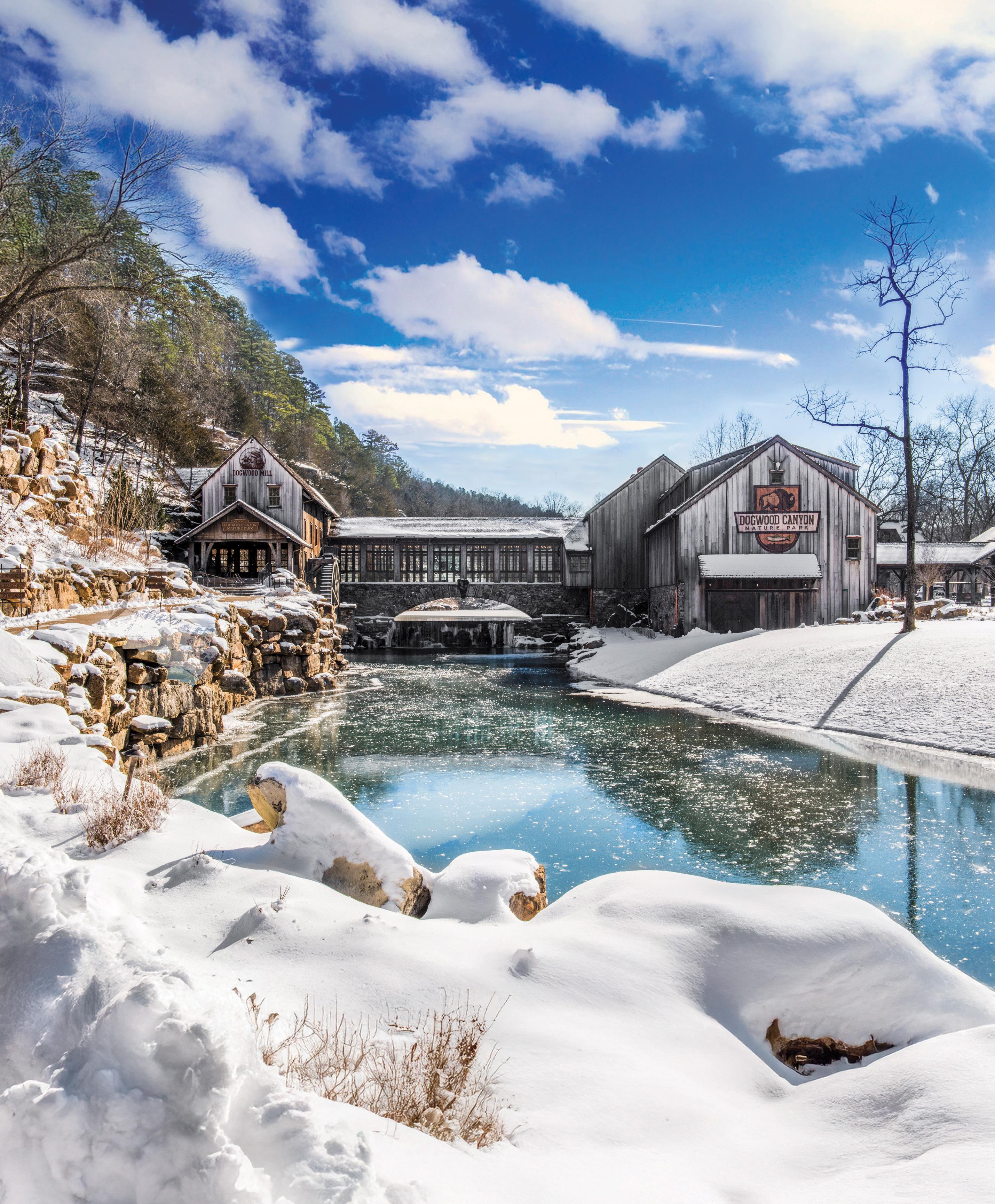

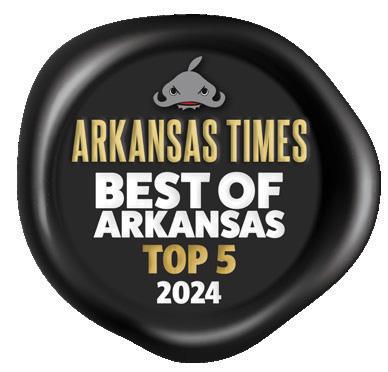
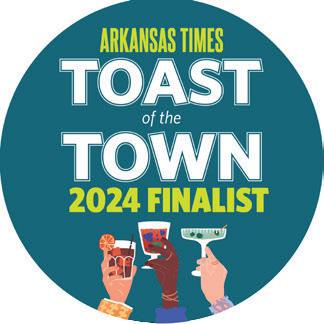


ARKANSAS TIMES PUBLISHER
WEIGHS BENEFITS OF FARMING RABBITS.
BY ALAN LEVERITT
Ihave decided to become a rabbit farmer. Rabbit wrangling does not get a lot of respect, I have discovered. As I explained my plans to a good friend the other day, he could not take his eyes off an imaginary spot on his shoe the whole time I was talking. I have been a mostly organic, market gardener for 30 years, and people treat that work with some respect. But news that I am building a rabbitry is met with the same polite puzzlement as when I talk about my stamp collection.
I have spent the last couple of decades trying to figure out a new business model for the economic ruin we call news publishing. We have made some progress. But just as interesting to me is the challenge of creating a profitable business model for small scale farming in the age of Big Ag.
I have learned as a market gardener to grow expensive stuff, sell retail, replant as I harvest, grow year-round and be open to new systems such as hoop houses and hydroponics. I think I would have been very much at home in the 19th century. Cow manure goes into the ground, great produce comes out. Season-extending hoop houses and new ways of growing such as hydroponics, with its pumps and liquid fertilizers, don’t come naturally to me, but now I’m all in. Traditional outdoor organic growing combined with both soil-based and hydroponic crops under plastic has changed the way I farm.
The hoop houses enable local farmers to grow high-value, cold-hardy crops such as butterhead lettuce and strawberries through the winter. These high tunnels also enable me to plant tropicals such as heirloom tomatoes, red bell peppers and cantaloupes up to six weeks before I could plant them outside in the spring. But I still need to grow and sell more in the winter, particularly if I want to keep William, my great summer helper, from taking another job when it turns cold.

The solution, I hope, is protein.
For about a decade, we raised meat sheep on the farm. We started with goats but discovered they were way too smart and could climb a tall, woven-wire fence surrounding a lush vegetable garden whenever they took a notion. My neighbors and relatives raised cattle but after my grandmother’s second cousin was nearly crushed against a cattle panel by a 1,200-pound steer, I opted for mere 100-pound sheep.
Sheep need a lot of hands-on care, particularly worming. You must gather them in a small corral, tackle and immobilize each one and shoot the concoction down their throat. I played defensive end for the North Little Rock Wildcats in 1970 and I’d come out of these worming sessions feeling like I had just played four quarters against the Hall High Warriors. Tackling 10 or 12 absolutely terrified 100-pound Hampshire sheep is a young man’s work.
My 70th birthday is an increasingly distant memory and I am hoping rabbit wrangling will be less athletic. I am starting with four bucks and 13 does, which should give me about 130 young rabbits for slaughter each quarter. The slaughterhouse we used for sheep has agreed to process and package the rabbits, which I will sell to my restaurants and at the Hillcrest Farmers Market.
Rabbits do well in the cold, but not so much in the extreme heat we are encountering now. Texas A&M has developed a heat-resistant rabbit called a TAMUK, a cross of seven dif-
ferent breeds that is vigorous, productive and can take this incredible heat. The most common meat rabbit is a white New Zealand, but their litters can die in extreme heat, so I am going to start with the TAMUKs. The cages will hang in an old peacock barn with an industrial fan to keep everyone cool.
I have been selling expensive, organically grown heirloom tomatoes and other vegetables to restaurants and the Hillcrest Farmers Market for many years. I’m now gambling there is a market for rabbit meat. Generally I have found affluent consumers will pay whatever a product is worth if it is quality. Rabbit meat has more protein and less calories, fat and cholesterol than chicken, but it’s expensive. Wholesale food distributors pay $10.30 per pound for a case of dressed rabbits. Each rabbit weighs about 2.5 pounds, so potentially you are looking at a $25 rabbit.
My friend with the spot on his shoe finally looked up and asked, somewhat doubtfully, what I found fascinating about raising rabbits. Clearly he saw nothing fascinating. But if you look closely and delve deeply, just about everything is fascinating. I could spend an hour talking about dirt and you would come away having learned something. But in this case, it is trying to fix a business model that forces most small farmers to have at least one family member “working in town” that I find fascinating. What combination of crops, systems, soils and markets can create a sustainable small-farm model? That question is as complicated — and as simple — as rabbits.

Arkansas Razorback forward Jonas Aidoo goes airborne for a slam dunk against the University of Central Arkansas Bears at Simmons Bank Arena on Dec. 14. Razorback Coach John Calipari said he was impressed with the size of the turnout of fans of both universities on a gray, rainy day. “I walk in here and see this crowd and that’s why we need to come here, to stick around and sign autographs, and let the people know, ‘Yes, we care,’” Calipari said after the Hogs’ 82-57 victory. “It was a great crowd.” Photography by


From
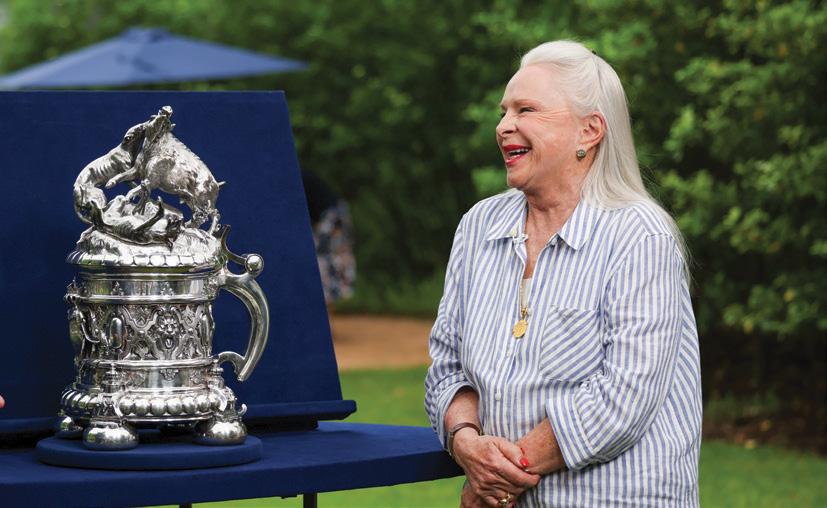
Watch highlights from all three episodes, and hear from special guests.
The first 100 registrants will receive free admission to the "Knowing the West" exhibit.


“The Grant helped me get a much needed break where I could check on my own mental health.”
“I appreciate the valuable information. It gave me a place to start when I felt lost.”
“The workshop empowered me.” “You are a blessing. The respite activities are always fun!”

Diana Gonzales Worthen, a Springdale native, educator and the first Latina elected to the Arkansas Legislature, was the only Democratic candidate in the state to flip a seat in the Arkansas House of Representatives this election, rematching and ousting one-term incumbent DeAnna Hodges in the state’s first majority-Latino district.
Gonzales Worthen will represent House District 9, which covers part of eastern Springdale. She will be on the Education; Aging, Children and Youth; and Legislative and Military Affairs committees.
Gonzales Worthen sat down with the Arkansas Times to reflect on her campaign and discuss what’s next.
You were the only Democratic candidate to flip a seat in the state Legislature this election. What do you think was different about your race? Our race was very close. Last time, I lost by 109 votes. One of the things our campaign did was we went back and researched what happened. One of the main things is people didn’t make it to the polls. We’re in the first majority-Latino district. We have a lot of first-time voters and a lot of them were unsure what to do. So part of that was now doing a lot of voter education: knowing where to go vote, how to vote, the dates for early voting. It can be a little bit confusing.
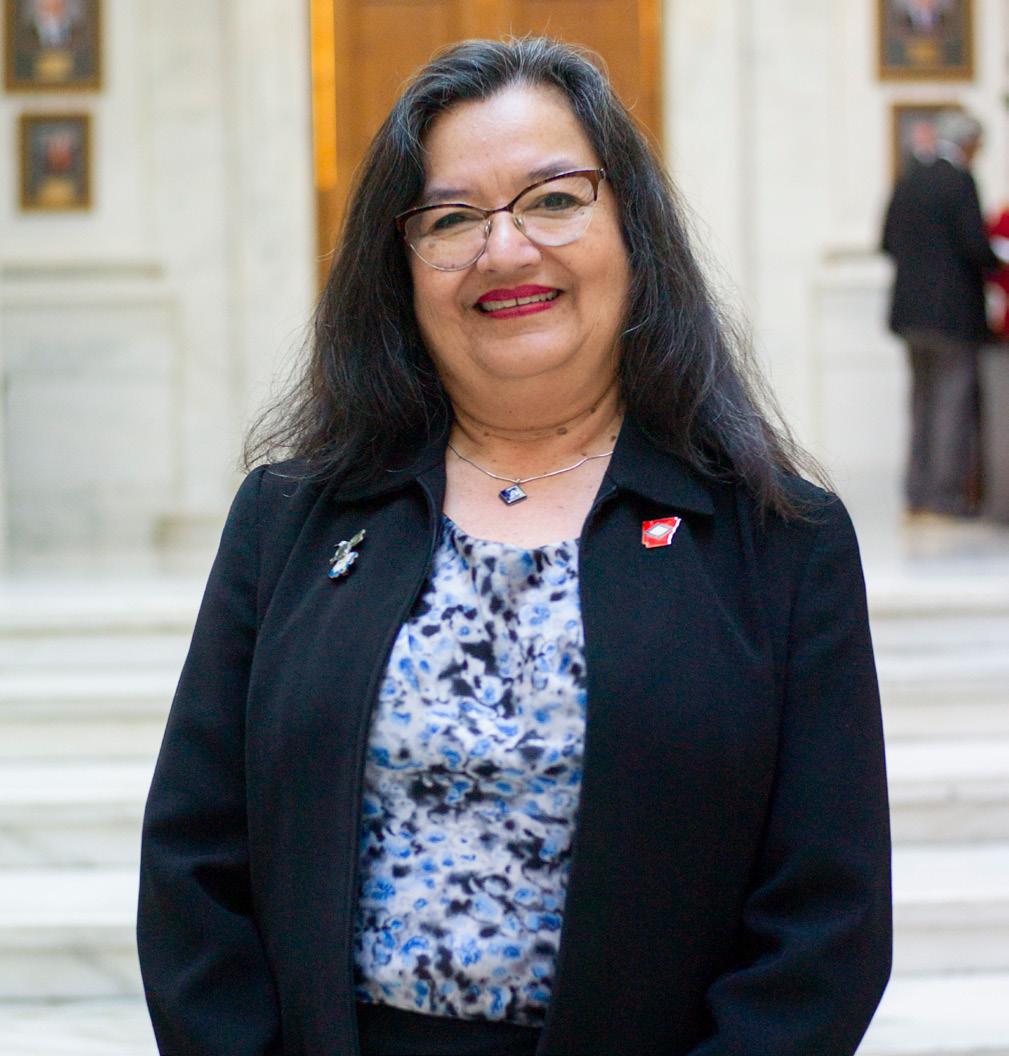
ANY BOOKS YOU’RE CURRENTLY READING, OR ANY RECENT FAVORITES? “Rising Class: How Three First-Generation College Students Conquered Their First Year” by Jennifer Miller and “The Discernment of Spirits” by Timothy M. Gallagher, O.M.V.
WHAT WILL YOU LISTEN TO ON THE COMMUTE FROM SPRINGDALE TO THE CAPITOL? “Music for Studying,” Vicente Fernández.
GO-TO/FAVORITE RESTAURANT IN ARKANSAS? Mojitos, Bites and Bowls, and World’s Best Java.
The other thing, I think, is that I’ve had a lot of people support me in all four runs. My first race was in 2006. I’ve had a lot of supporters, I’ve been doing a lot of work in the community, I’m an educator. Those individuals and families have been following me since that time.
What parts of your campaign resonated most with voters? Our campaign was built on strong schools, strong families and a strong Springdale.
Just in District 9, which is east Springdale, there are 14 public schools and the majority of families and friends who support me go to public schools. I think that definitely resonated well. People know that I am an educator because I’ve been doing that for over 35 years, and so they know my work and they know I have been trying, when there’s a gap in services, to fill that gap, whether it’s access to a special-education curriculum or extracurricular activities.
I think that resonated because of the passing of the LEARNS Act. There was money taken away from public schools, and in our area, where we have a lot of families who are in public schools,
some of those services are hard to come by on some accounts.
You’re the first Latina elected to the Arkansas Legislature. What does that milestone mean to you and why is it important? I’ve often said: I may be the first but I won’t be the last. This has inspired a lot of people to come up to me and say, you know, “My four daughters? You’re their role model now, and I want to let them know that they can do this, too.” Since I’m an educator, I don’t mind sharing and teaching what I’m learning through this process, and I’ve already had a lot of questions posed. Some Latinas have come up to me and said, “You know, I’ve thought about running for office. Now I think I want to do it.” If it encourages others, absolutely that’s what I want.
Democrats in the Legislature face an overwhelming Republican supermajority in both chambers. What’s the strategy moving forward? A lot of us have been working in the community already on a variety of things. They’re really common-ground issues and challenges that all communities have. The education piece is key, that’s very important. Second, having more opportunities for higher education, ensuring that Arkansas can continue building its workforce.
We want our state to be ranked up at the top, but there’s still some areas that we’re ranked at the bottom. We’re all wanting [better] maternal health, more access to affordable health care, more access to mental health care resources and the like. We know our grade-level reading is actually lower than it was before COVID, so we still have work to do in that arena.
In addition to being the only majority Latino district in Arkansas, House District 9 is also home to many of Arkansas’s Marshallese population. Do you have any concerns about the incoming Trump administration and its talk of mass deportations for undocumented immigrants? People have come up to me already asking about immigration, about what happens to our DACA students. Are we still going to be able to become naturalized citizens in the future?
What I’m telling the people of the district is, at this point, we don’t really know what will happen, but they can count on me. I’m going to be working hard to do whatever I can to keep families together and ensure that our DACA students, for example, can maintain their jobs.
—Milo Strain
$3.6 MILLION
BY AUSTIN GELDER ILLUSTRTAION BY LAYET JOHNSON
Roughly 15 years in the making, Arkansas’s own big dig project is set to be all finished and ready for action by the time the legislative session starts Jan. 13.
First conjured in the aughts, the subterranean passageway between the Arkansas Capitol and the Multi-Agency Complex building (aka Big MAC) was nixed by Gov. Mike Beebe in 2009 for being wildly expensive and completely extraneous. How hard is it really to walk 50 yards from door to door?
But the tunnel plan finally won approval in the summer of 2023. Turns out we just needed to wait until Republicans, party of fiscal responsibility, were calling all the shots.
Senate President Bart Hester (R-Cave Springs) touted the tunnel as a safety feature for people who struggle to walk outdoors and carry paper at the same time.
“Session is in winter, and we deal with a lot of inclement weather,” Hester told the Arkansas Advocate in December. “From something as basic as staff traveling from building to building — and they travel … sometimes with thousands of pages of printouts — we just think it’s for safety as we’ve had staff fall over the past years. For efficiency, I think there’s going to be a lot of benefit.”
Whether and when the tunnel might be open to the public remained unclear at press time. And we weren’t able to get a sneak peek. So here’s a sketch of what we *think* the tunnel will look like.
1. Capitol catacombs 2. Security cam captures a voucher-funded equestrian cantering on Capitol grounds, charitably creating an opportunity for a public school student to complete mandatory community service hours. 3. Make-out central 4. Sen. Bart Hester, marked safe from inclement weather. 5. Eek! Rats!



Saturday,
Simply





BY DANIEL GREAR, OMAYA JONES AND DAN MARSH

SATURDAY 1/25-SUNDAY 1/26. ROBINSON CENTER. 7:30 P.M. SAT., 3 P.M. SUN. $19-$93.
Pairing guest conductor Joseph Young (Berkeley Symphony’s music director) with piano soloist Zee Zee (“a powerful, passionate and compelling representation of pure artistry” — Los Angeles Times), the Arkansas Symphony Orchestra’s upcoming performance of Franz Liszt’s Piano Concerto No. 1 is sure to be a knockout. We have high expectations, considering it took him over a quarter-century to complete! Also on the program is Samuel Coleridge-Taylor’s Ballade in A minor and William Dawson’s “Negro Folk Symphony,” which integrated cherished spirituals from his childhood. The piece — originally performed in the 1930s, revised after a visit to West Africa in the ’50s and forgotten about for decades — resurged in popularity alongside the Black Lives Matter protests of 2020. Get tickets at arkansassymphony.org. DG

TUESDAY 1/14-SATURDAY 1/18. ROBINSON CENTER. 6:30 P.M. $21$94 PER NIGHT.
The art of female illusion, also known as drag, will be celebrated in Little Rock once again as winning contestants from regional and state preliminaries across the U.S. converge on Robinson Center for four nights of sparkly yet stress-inducing competition for the national crown. Organizers, who’ve chosen Arkansas as the site for the Miss Gay America Pageant nearly a dozen times since its founding in 1972, say anti-LGBTQ Arkansas is surprisingly affordable for participants, who are responsible for funding dancers, costumes and hotel rooms on their way to cash, gifts and jewelry prizes — in addition to feeling fabulous as 2025's reigning queen. Get tickets at ticketmaster.com. DM
FRIDAY 1/24. WHITE WATER TAVERN. 8 P.M. $12.
Central Arkansas honky-tonk veterans The Salty Dogs, led by hotshot baritone Brad Williams and featuring Isaac Alexander, are technically the headliner for this cozy winter show at the White Water Tavern, but I might be even more excited for the openers, a trio of accomplished Little Rock singer-songwriters — Amy Garland, Emily Fenton and Shannon Boshears — who’ll be performing in rounds. For the uninitiated, what that means is that the three will rotate through original songs, each playing one at a time and pausing between tunes to offer some hearty commentary about their inspiration and writing process. Get tickets at whitewatertavern.com. DG

THROUGH MONDAY 1/27. CRYSTAL BRIDGES MUSEUM OF AMERICAN ART, BENTONVILLE. $12.
When “Knowing the West” debuted at Crystal Bridges Museum of American Art in September, Fayetteville Flyer noted that “the viewer cannot look at [Albert Bierstadt’s] ‘Sierra Nevada Morning’ without also seeing baskets and bowls made by indigenous artists. Baskets by Elizabeth Hickox and her daughter Louise Hickox (both of the Karuk nation) are positioned directly in front of Bierstadt’s idyllic view of the mountain range. The native plants like wild grape roots that provided fibers for the baskets would have surrounded Bierstadt at his every footstep.” In other words, the traveling exhibition — a collaboration between Crystal Bridges curator Mindy Besaw and Osage curator Jami Powell — is dedicated to telling the story of the American West in a more inclusive fashion, balancing the work of prominent creators with pieces by artists like Dorothy Brett, Grafton Tyler Brown, Chiura Obata and Nellie Two Bear Gates. Anyone who took in “Action/Abstraction Redefined: Modern Native Art, 1940s to 1970s” at the Arkansas Museum of Fine Arts in early 2024 might conceive of “Knowing the West” as a kind of prequel to that exhibition. Get tickets at crystalbridges.org. DG
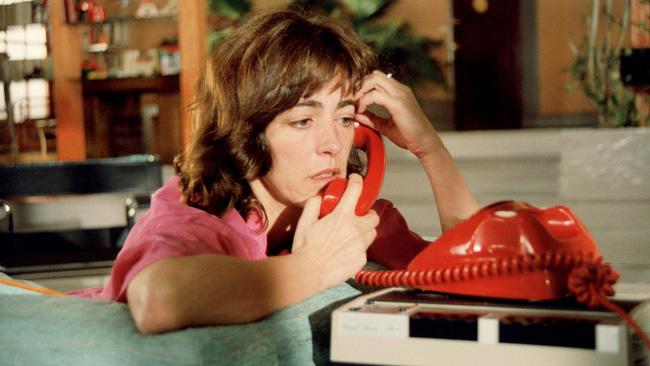
TUESDAY 1/21. RIVERDALE 10 VIP CINEMA. 7 P.M. $12$14.
In Pedro Almodóvar’s “Women on the Verge of a Nervous Breakdown,” Pepa (Carmen Maura) and Iván are voice actors and lovers. Iván leaves her without warning and Pepa, having a very important message to deliver, tries to reach him by phone but only gets his answering machine. What ensues is a madcap plot involving telephones, spiked gazpacho, a complex web of relationships and a young Antonio Banderas. “Women on the Verge” pays homage to Almodóvar’s classical Hollywood influences, particularly in tone. It’s easy to see his admiration for directors like Howard Hawks (“His Girl Friday”) and Billy Wilder (“Some Like It Hot”). The 1988 movie was a breakthrough success, becoming — at the time of its release — the highestgrossing Spanish film of all time and scoring both Oscar and Golden Globe nominations for Best Foreign Language Film. Get tickets at riverdale10.com. OJ
SATURDAY 1/11. ROBINSON CENTER. 7:30 P.M. $53-$73.
Randy Travis fans will likely be in their feels when the country music superstar known for tracks like “Forever and Ever, Amen” and “Three Wooden Crosses” welcomes guest vocalist James Dupré to Robinson Center on the second stop of Travis’ More Life Tour. Dupré, a rising country sensation in his own right, provides the vocals to Travis’ extensive catalog of beloved hits, including a new AI-generated single (“Where That Came From”), alongside Travis’ longtime band. Travis, who suffered a near-fatal stroke in 2013 that took away his ability to speak and sing, and his wife, Mary, will be on hand to remind fans of the enduring mark the singer-songwriter has made on culture as well as FM radio. Get tickets at ticketmaster.com. DM
MONDAY 1/13-SUNDAY 2/16. WINDGATE CENTER OF ART + DESIGN, UALR. 5 P.M. FREE.
January won’t be your last chance to see the 2025 edition of “Small Works on Paper” — an annual exhibition of Arkansas art no larger than 18-by-24 inches that’s been traveling the state for 38 years running — but let’s be honest: It’s fun to be first. The inaugural show on the exhibition’s nine-stop tour throughout Arkansas takes place at UALR’s Windgate Center of Art + Design, where an opening reception will be held from 5-7 p.m. on Jan. 30. Selected from a pool of over 200 entries, 40 pieces will be on display from stellar Natural State artists like Little Rock’s Kasten Searles (a recurring Arkansas Times cover artist — her inventive depiction of mail-in ballot rejection was nominated for an award last year), Fayetteville’s Sean Fitzgibbon (check out “What Follows Is True: Crescent Hotel,” his 240-page graphic novel about Eureka Springs’ very haunted Crescent Hotel) and Rogers’ Steven Wise (an artist of breathtaking simplicity whose paintings have been featured in “Small Works on Paper” 10 times over). No tickets are necessary. DG


FRIDAY 1/3. VINO’S BREW PUB. 7 P.M. $12.
Considering a Dry January but aren’t sure how you’re going to stay amped in the absence of alcohol? Working off a lingering New Year’s Eve hangover and need an equalizing dose of sonic medicine? This stacked Vino’s bill full of bands who know how to keep the energy high without ever quite devolving into the chaos of heavy metal might be precisely the solution. Headliner Joybomb (pictured above) will be coming to town from Memphis, but the lineup is otherwise purely local, with newcomers King Laugh kicking off the show and Central Arkansas staples PETT and Salon Blonde serving as the creme to this Oreo cookie of indie rock goodness. PETT’s “Whimsical Hymns” was one of my favorite Arkansas albums of 2024, in part because the group so successfully prioritizes both vocals and musical intricacy. Their tangled, ever-evolving arrangements are sophisticated enough to be solely instrumental, yet melody and catchiness never get short shrift. They’re a can’t-miss status band. Get tickets at the door. DG

FRIDAY 1/3-SUNDAY 1/5.
HISTORIC MALCO THEATRE, HOT SPRINGS. $65 WEEKEND PASS, $25 PER DAY.
Previously known as Arkansas Shorts, Hot Springs nonprofit organization Low Key Arts is rebranding and expanding their long-running celebration of abbreviated cinema in 2025. The festival has a new title, “Persistence of Vision,” and is no longer focused exclusively on short films. The threeday event will now include “feature films, documentaries, additional panels, workshops, parties and special guests.” Among the dozens of titles on the POV itinerary is “Ozark Wabi,” a patient and affectionate documentary by Little Rock directors Eliot Peterson and Molly Wheat. The film chronicles a week in the life of Oark artist and teacher Stephen Driver, a decades-long adherent of the Japanese school of pottery known as Wabi and a back-tothe-lander who moved to rural Arkansas in 1976. It’s hard not to walk away with an appreciation for the beauty and simplicity of a life lived like Driver’s. Get tickets at pov-fest.com. DG


Dear










ROLL BACK: Medicaid expansion has been a good thing for many Arkansans, but some Republicans have long sought to kill it.

220K ARKANSANS WILL LOSE INSURANCE IF REPUBLICANS CUT FEDERAL MEDICAID EXPANSION FUNDING.
BY BENJAMIN HARDY
Arkansas has been an unlikely leader in Medicaid policy over the past decade. It was one of the first Southern states to embrace Medicaid expansion under Obamacare, thus giving health coverage to hundreds of thousands of low-income Arkansans. Despite conservatives’ efforts in the years since to either restrict the program (remember the 2018 work requirement?) or kill it outright, Arkansas’s Medicaid expansion lives on. It now covers more than 220,000 people.
Now, with Donald Trump returning to the White House and Republicans in control of Congress, it seems inevitable Medicaid will be pared back or subject to new restrictions. The question is just how far Republicans will go. Will they be content to trim the program around the edges by placing more bureaucratic hurdles and work mandates in the way of people seeking health insurance? Or will they try to gut Medicaid expansion entirely?
According to a disturbing new report from KFF Health News, the latter may be easier to accomplish than it initially seems, at least in some states. Arkansas is one of them.
Arkansas is one of nine states with a trigger
law that would automatically end Medicaid expansion if the federal match rate for the program drops below a certain level. Should congressional Republicans cut federal funding even by a small amount — as congressional leaders have proposed — Arkansas’s program will evaporate, leaving countless people with no insurance options. Those people would likely forgo regular doctor visits, prescription refills and preventative care such as cancer screenings. And more Arkansans would turn to emergency rooms for primary care, racking up unpayable medical bills and hastening the decline of rural hospitals.
To understand why, let’s review some basics. Medicaid is a giant, sprawling patchwork that provides coverage to many different groups — disabled people, pregnant women, children, elderly people in nursing homes, etc., all of which have different income eligibility thresholds. Obamacare, also known as the Affordable Care Act, “expanded” Medicaid to create another coverage category — working-age adults who earn less than a certain percentage of the federal poverty level. (The
annual income threshold is 138% of the poverty line, which works out to about $43,000 for a family of four or $21,000 for a single person.)
But not every state opted to expand Medicaid as envisioned under Obamacare. That’s because Medicaid is a joint state-federal operation. The federal government sets broad rules, but states have a good deal of latitude to run their own programs how they see fit. Blue states generally embraced Medicaid expansion in the 2010s, but many red states refused to do so.
Medicaid costs are also split between federal and state governments, with poor states getting a more generous “match” from the feds than richer states: Arkansas, with its high poverty rate, pays for only about 30% of the cost of most Medicaid services, while federal taxpayers pay for the other 70%. (The average federal match nationally is more like 57%, according to KFF.) To incentivize states to accept Medicaid expansion, Obamacare offered every state a much more generous rate on the group of people covered by Medicaid expansion — a 90% match. States only have to pay the other 10% of the expansion program’s costs. It’s a sweetheart deal for states, which is

why even many red states have reluctantly signed up for Medicaid expansion in the years since Obamacare was passed. Only 10 holdouts remain today, most of which are in the South. As a result, there are now many fewer Americans without insurance than there were 15 years ago.
In Arkansas, the uninsured rate has been almost cut in half since Medicaid expansion started in 2014. The program has been called many things over the last decade — the “private option,” “Arkansas Works” and now “ARHOME” — but it’s provided health care access to hundreds of thousands of people. ARHOME covered about 224,000 beneficiaries as of Nov. 1, according to the most recent report from the state Department of Human Services.
All that could change, though, if Congress cuts the 90% match rate, as some conservatives are pushing to happen.
When the Arkansas Legislature authorized Medicaid expansion back in 2013, lawmakers were suspicious the federal government might one day backtrack on paying such a large share of the costs. So, they wrote a provision into the Medicaid expansion legislation that the program would be wound down within four months if the match rate is ever lowered. The current version of the law requires DHS to present federal Medicaid authorities with a plan to terminate the ARHOME Program within 30 days, should the match be reduced to below 90%.
This matters in part because Arkansas conservatives have always wanted to undo Medicaid expansion. The state embraced the program at a moment when Republicans were on the rise in state government but Democrats were not yet powerless; the original bill passed in 2013 thanks to the bipartisan work of thenGov. Mike Beebe, a Democrat, and a group of moderate Republican legislators.
Since then, conservatives such as state Sen. Bart Hester — now the Senate president pro tempore — have repeatedly tried to kill the program. They’ve repeatedly failed. The prospect of cutting insurance for so many people proved too politically dicey, especially considering hospitals and other big health care interests want Medicaid expansion to stay put. There is no chance the Republican legislative majority would approve expansion today if the program were presented to them fresh, but they’re afraid to yank away an existing benefit from hundreds of thousands of people.
But the trigger law could give Arkansas conservatives a workaround: If Republicans in Congress cut funding for Medicaid expansion at the federal level, DHS would be required to end the program and state legislators could pretend their hands are clean.
That wouldn’t actually be true, of course, be-
cause the state Legislature could and should revise state law to remove the trigger. If they sit idly by while Medicaid expansion is undone, state lawmakers will bear just as much responsibility as Congress. Still, it’s easier for a politician to sit back and do nothing than to affirmatively cast a vote to end a program.
Whether Republicans in Congress can really make such dramatic cuts is a different story. The last time Trump was in the White House, the GOP’s efforts to repeal Obamacare famously went up in flames. Since then, the Republican Party has in some respects only grown more populist, at least rhetorically. While Elon Musk and others are vowing to slash trillions of dollars from the federal budget — a goal that would require enormous cuts in entitlement programs like Medicaid — Trump hasn’t so far proven to be one for disciplined policy choices or fiscal austerity.
The more likely route may be for Republicans to just make Medicaid stingier, harder to access and less useful for the people it serves. State-level work requirements will almost certainly return in the second Trump administration. One Arkansas Republican on the House Public Health Committee, state Rep. Aaron Pilkington, recently told Stateline a work requirement is “100% on the table and something we’ll look to ask for from the Trump administration.”
That’s despite the state’s own admission last year to the Biden administration that Arkansas’s work requirement experiment back in 2018 was hardly a success. “While the intent was to encourage beneficiaries to engage in their communities and the workforce to achieve economic growth and eventual independence from government dependency, the monthly reporting of engagement hours was burdensome,” DHS officials wrote in a document sent to federal Medicaid authorities in June 2023.
Research has shown most Medicaid expansion recipients do indeed work, regardless of the state’s rules — after all, ARHOME provides health insurance, not a paycheck, and people must still make rent and pay bills. Instead of pushing indolent people into the workforce, Arkansas’s 2018 work requirement mostly created new red tape and meaningless bureaucratic hoops to jump through. People had to log their work hours using a glitchy, confusing web portal, creating problems for those with limited internet access or computer skills.
Many of the roughly 18,000 Arkansans who were kicked off their insurance in 2018 were in fact working but were unaware of the new rule. The state, led at the time by Gov. Asa
Hutchinson, thus punished people not for failing to hold down a job, but for failing to log onto a DHS website and plug numbers into a form.
But work requirements remain alluring for Republicans. Perhaps that’s less because they’re effective at pushing people to work and more because they simply keep people away from public benefits they should qualify for, thus saving states money.
It is true that Medicaid is enormously expensive. The total cost of the program in Arkansas in 2023 was $8.6 billion, of which the state paid more than $2 billion. If Gov. Sarah Sanders and fellow Republicans want to keep cutting income taxes for corporations and higher-income Arkansans, the cost of Medicaid must be held down.
But that also comes with costs: More uninsured people means more bad debt for rural hospitals, many of which are already financially shaky. Hospitals are required under federal law to treat people who need emergency services, and if more of those patients are unable to pay their bills, hospitals will be forced to absorb the cost. Some will likely close. And more Arkansans will lose access to basic health services, forgo necessary treatment until it becomes an emergency and be bankrupted by medical debt.
Gavin Lesnick, a spokesman for DHS, said the agency hasn’t been in contact recently with federal authorities about the possibility of adding a work requirement. But DHS is “always working on ways to make Medicaid more efficient and effective,” he said.
“This focus includes creating meaningful ways for beneficiaries to move from depending on government health insurance coverage to gaining economic independence,” Lesnick wrote in an email. “We look forward to continuing these conversations both within our agency and with the Governor’s Office, the Legislature and other key partners.”
As shown by the recent outpouring of schadenfreude over the killing of a UnitedHealthcare CEO in Manhattan, Americans are fed up with the country’s dysfunctional health care system. Ironically, the coverage provided through Arkansas Medicaid expansion is better insurance than much of what’s now available through private, employer-sponsored insurance: It comes with no deductible, the state pays the premiums and beneficiaries pay reasonable co-pays on a sliding scale based on household income. In a saner country, the people in charge would be working furiously to find a way to extend that sort of coverage to more citizens. But in America, and especially in states like Arkansas, they’re instead looking for ways to roll it back.

CABOT
501-941-3101
CONWAY
501-513-9700
HEBER SPRINGS
501-362-3100
HOT SPRINGS
501-547-8372
LITTLE ROCK 501-907-7330
LITTLE ROCK MIDTOWN 501-221-2700
NORTH LITTLE ROCK 501-791-7546
RUSSELLVILLE 479-223-5000
SEARCY
501-268-1500
STUTTGART (Tuesday Only) 870-659-8050

Saturday, January 25, 2025 11:00 am to 2:00 pm – FREE TO ATTEND
Statehouse Convention Center | Wally Allen Ballroom 101 W. Markham Street, Little Rock, AR 72201 littlerockschoolfair.com/attend

CAN YOU REALLY USE AN ARKANSAS SCHOOL VOUCHER FOR HORSEBACK RIDING LESSONS? YES.
BY BENJAMIN HARDY
Ahorse stable in Fayetteville found itself in the middle of a social media fracas in November over a Facebook post encouraging homeschool families to use their school vouchers on riding lessons.
“Our expert instructors will teach you everything you need to know about horse care, riding techniques, and more, while giving you hands-on experience in a group or individually with our well-trained horses,” said the post by Parkerman Stables, which has since been deleted. “We now proudly accept Arkansas Learns!”
The Arkansas LEARNS Act, signed into law in 2023 by Gov. Sarah Sanders, created a voucher program that sends public money to private school families to use for tuition, fees and other expenses. This school year, the program is open to many homeschoolers as well. Homeschool families don’t have tuition bills to pay, but they’re able to use voucher funds for a variety of other education-related expenses, such as books and supplies, curricula, computers and other technology, and private tutoring.
Extracurricular activities are also fair game. A list of 689 “education service providers” that have applied to participate in the LEARNS voucher program as of Dec. 3 includes climbing gyms, dance studios, jiu-jitsu instructors — and at least 13 equestrian-related vendors,

according to a cursory review by the Arkansas Times. Of those, nine had been approved by the education department as of Dec. 3 and the other four were in need of “clarification/ details on part of their submission,” according to the department.
Some vendors appear to focus in whole or in part on “equine-assisted therapy” services for people with disabilities or trauma. Others appear to simply offer kids the opportunity to ride, interact with and care for horses. But all of them have been given the go-ahead by the Arkansas Department of Education to receive taxpayer dollars at a time when the state has cut inflation-adjusted spending in other areas.
Relatively speaking, equestrian centers are unlikely to eat up too much of the overall voucher pie. Each LEARNS voucher costs the public about $6,856 in the current 2024-25 school year, and there are about 14,000 students in the program this year, most of whom attend private schools. (About 3,000 are homeschooled.) The majority of the roughly $96 million that Arkansas spends on vouchers is flowing to private schools such as Little Rock Christian Academy or Shiloh Christian School in Springdale.
The idea of publicly subsidizing horseback riding seems to strike a nerve in a way that paying private school tuition does not. But one could argue there’s not a lot of difference between the two.
There are no income-eligibility requirements for either homeschool or private school households to receive a voucher. Well-off homeschool families who already were paying out of pocket for riding lessons before Arkansas LEARNS can now get them comped by the state. In the same vein, families who paid private school tuition before LEARNS are now getting a taxpayer-funded boost to their bank accounts, freeing them to spend that money on whatever else they please — including horseback riding, if they wish.
Angela Walters, a representative of Parkerman Stables, said in November that the business has only recently been approved as a vendor by the state and that she was surprised by the negative reaction to the Facebook post. She declined to comment otherwise.
Asked whether the state considered horseback riding a valid use of funds, a spokeswoman for the Department of Education pointed to the most recent set of rules for “Educational Freedom Accounts,” the state’s name for the voucher program.
“The department reviews every expenditure to ensure it aligns with the rules linked below,” spokeswoman Kim Mundell said. “We investigate instances of inappropriate use of funds and encourage the public to report those to the department.”
The rules give little insight into what services can qualify for voucher funds. Tuition,
fees, testing costs and school uniforms are on the list. But so are open-ended categories such as “instructional services” and “supplies.” (The rules are, at least, specific about “technological devices”: Computers are allowed, if they cost under $1,000, but TVs, video game consoles and home theater equipment are out.)
The education department’s website also provides some public-facing guidelines about what services and items can be purchased with voucher funds. The criteria alternate between being quite vague and surprisingly specific. Paper towels, Ziploc bags and Wet Wipes are on an “ineligible expenses” list, along with memberships to “museums, zoos, etc.” Music lessons, gymnastics and dance classes are explicitly allowed, though “no more than 2x/week.”
But the “eligible expenses” list also includes a catchall “instructional services” category, along with a caveat at the top that would seem to allow education department officials to greenlight almost any vendor they so choose: “Please note, this is not an exhaustive list.”
‘TOO
Borderless Horsemanship, a small riding school in Rogers, is not yet on the education department’s vendor list, but owner Sabrina Dobbins said she recently received approval from the state to participate.
“I had a parent reach out to me, and she’s like, ‘Hey, you should look into this.’ And I was like, ‘Hold up. This sounds too good to be true,’” Dobbins said in a phone conversation in November.
The education department asked her questions about the services Borderless Horsemanship offered, Dobbins said, to ensure students would be taught functional skills. “They ask you, ‘What is the scope of your lessons? … What are the tools that you use? What are the terms that you use? How do you ride? How do you lunge? How do you handle the horse on the ground? How do you dissect equine behavior?’
“They wanted to make sure that … the student is actually learning something, not just getting on the horse and sitting there.”
Dobbins believes horseback riding, if taught properly, is a legitimate use of educational funds.
“It does incorporate a lot of physical education, as well as mental benefits,” she said. Learning to ride a horse “allows you to problem-solve in real time and get feedback from something that doesn’t understand human language. It’s almost like you’re becoming bilingual in a language that’s very senso-
ry-based, if that makes sense.” Many colleges and universities offer equestrian programs, she pointed out.
Dobbins, who typically charges $50 per hour of instruction, has two students who were already coming to her for lessons before Arkansas LEARNS vouchers became available. “In fact, they were part of my program before I became an [Educational Freedom Account] vendor,” she said.
Those families will now pay her with taxpayer-funded voucher money, rather than out of their own pockets. And Dobbins expects a third to sign up soon.
Other vendors are focused squarely on the therapeutic benefits of riding. Equestrian Zone, a 501(c)(3) nonprofit in rural Yell County south of Dardanelle, primarily serves children and adults with disabilities, from Downs syndrome to cerebral palsy. Largely staffed by volunteer therapists and retired teachers, the organization is certified through PATH International — the Professional Association of Therapeutic Horsemanship — to provide occupational therapy, physical therapy, psychotherapy and other services.
“If you called me and said you had a child who wanted to learn barrel racing, I refer them somewhere else,” said Connie Holt, Equestrian Zone’s director and only full-time employee. “We do not do pony rides. We don’t do birthday parties. … Everybody with this team is a certified therapist.”
Heather Taylor, a regular Equestrian Zone volunteer, said the nonprofit was only recently approved as a voucher vendor and hasn’t “accepted one LEARNS dollar” so far. But unlike riding schools in Northwest Arkansas and Central Arkansas, the organization is serving a rural area where wealthy households are few and far between. “We hope that the families that we do attract are the ones that have been left out,” she said.
Still, is it fair for those services to be available to a child receiving a voucher when they’re not available to public school students?
“The tax dollars are something that is being managed at a state level, so we can’t say,” Taylor said. “But what we can say is that this actually opens up for those families that were being neglected by the education system.”
Holt said there’s a world of difference between the therapeutic services provided by Equestrian Zone and a typical horse riding lesson.
“Can people paint any kind of physical activity as educational?” she said. “I’m sure they could. But please don’t broad-stroke us into that group, because we provide something very different.”








FIVE ARKANSAS WOMEN SHARE WHAT THEY’VE LEARNED OVER DECADES IN THE FIGHT FOR ABORTION RIGHTS, AND SUGGEST NEW TACTICS ARE IN ORDER.
BY DEBRA HALE-SHELTON PHOTOGRAPHY BY BRIAN CHILSON


For decades, five women have waged an often difficult, sometimes frightening and always highly personal war in the fight for abortion rights in Arkansas. The battles have taken these women from Planned Parenthood clinics to hospitals, from legislative chambers to courtrooms, from events where thousands of men and women signed abortion-rights petitions to the state Capitol where a single public official promptly nullified the effort. Yet these women, these warriors, have not surrendered. They’re already planning for the next four years as Republicans regain control of the White House and Congress.
Let me introduce you to:
• Bettina Brownstein, civil rights attorney and political activist.
• Dr. Janet Riley Cathey, retired obstetrician-gynecologist at hospitals and at Planned Parenthood.
• Murry Newbern, former lobbyist and policy analyst for Planned Parenthood.
• Rita Sklar, retired executive director of the American Civil Liberties Union of Arkansas.
• Lori Williams, retired nurse practitioner at Little Rock Family Planning Services.
These Arkansas warriors are among those who have led the fight against a legal system created and largely controlled by men, against religious beliefs that too many try to force on others, and for women who may want to end a pregnancy whether because of health issues, rape or incest — or simply for other personal reasons.
Trying to impose religious views on others is especially problematic when it comes to the question of when life begins. Brownstein, for example, is Jewish and noted that Judaism teaches that life begins at birth. As a result, she said, most Jews are pro-choice.
And at 76, Brownstein is not ashamed to talk about her own abortions.
“I have had more than one abortion,” she said. “I don’t mind talking about it. We have to be open about our abortions or we will forever be captive of the anti-abortion forces.”
Besides, Brownstein noted she is not a Christian and could not care less "about some Christian trying to impose their religious views on me,” although she finds that prospect “extremely offensive.”
“My abortions worked out fine for me. I never regretted them, and I ultimately had a child when I wanted to and had an easy pregnancy and delivery,” she said.
The biggest challenges women now face, Brownstein said, are “Christian fundamentalism and fundamentalist preachers” who, she noted, are men “who tell women it's a sin to

“MY ABORTIONS WORKED OUT FINE FOR ME. I DON’T MIND TALKING ABOUT IT.”
—BETTINA BROWNSTEIN

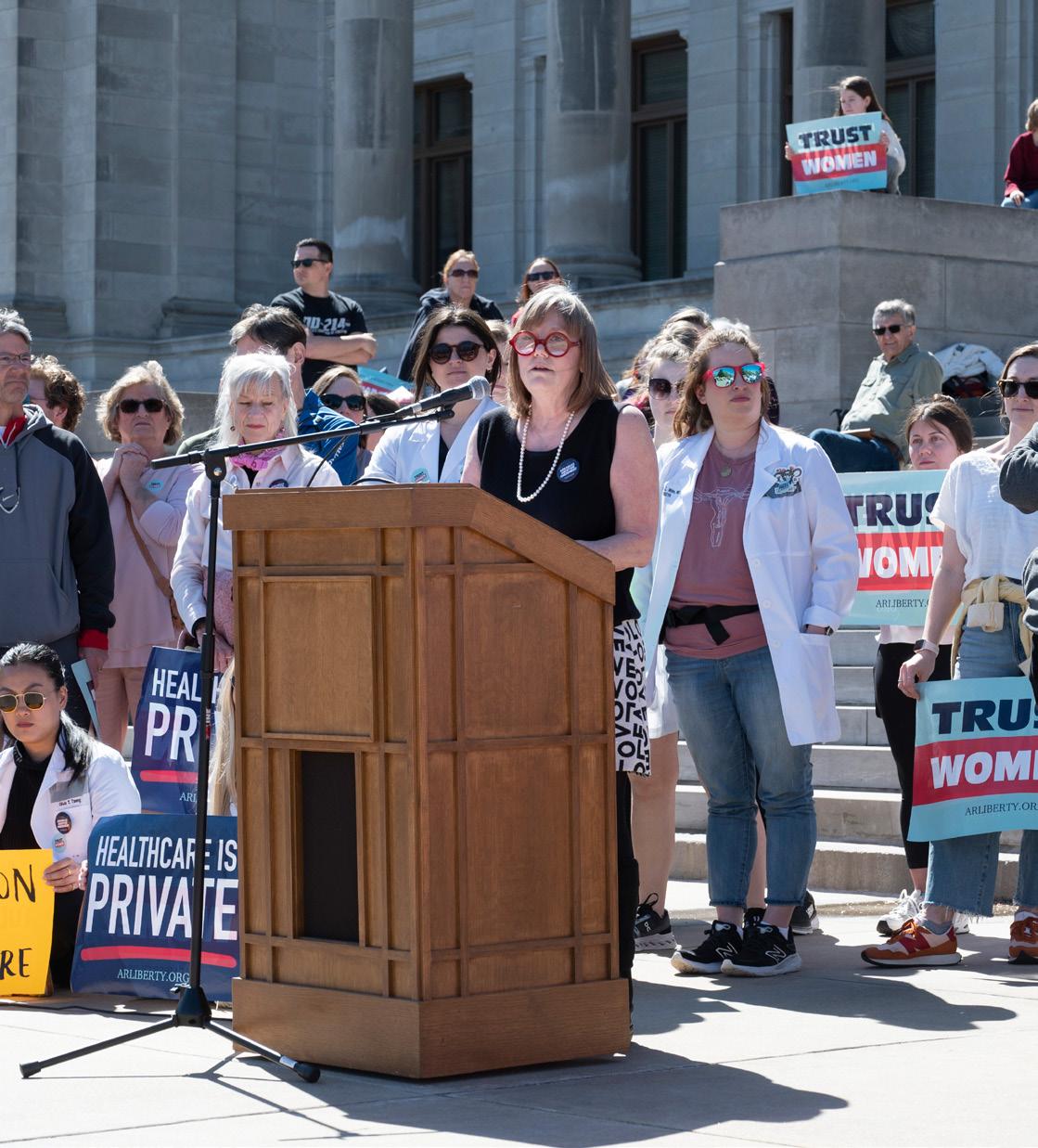

have an abortion.”
Indeed, Cathey noted that Arkansas law now holds that life begins at conception.
“Isn’t it incredible the Arkansas Legislature can know what scientists, philosophers and theologians have debated for centuries?” Cathey said with a note of sarcasm.
“When life begins is different for different cultures and religions. Jewish people believe it is at first breath,” Cathey said, while some religions teach that life begins when the baby is half out of the mother’s womb as it then becomes “a separate being.” Still others, she noted, say life begins when the mother feels the fetus move. The view that life begins at conception is a Catholic and evangelical belief, she said. “I respect that. But putting it into law forces your religious [views] on me. That is not what we do in the United States of America.”
At 68, Cathey still recalls what was perhaps her “first act of activism.” It was 1974, the summer of her junior year in high school, and she and another teenage girl drove a friend to Dallas to have an abortion.
The teenagers knew abortion was legal then but had no idea where or how to get one. They looked in the local Mountain Home phone book and found one abortion listing. It was a Dallas number. The girls had no idea abortion was then available in Little Rock. Meanwhile, the single, working mother of the pregnant teen got a $200 bank loan, and the girls headed to Dallas, where they stayed at an Econo Inn.
“On Friday, we went to Six Flags, Saturday she had her procedure, and Sunday we came home,” Cathey recalled. “My dad just thought we were going camping for the weekend.”
Newbern said she “would have some respect for the anti-abortion activists if they spent time, resources and energy on unintended pregnancy prevention.” But, she said, “They do not.
“We, however, are dedicated to making sure that people have access to affordable contraception, access to evidenced-based sex education in addition to access to abortion services,” she said. That the opponents do nothing “to prevent unintended pregnancy makes me assume they are just interested in shaming women, controlling women and keeping women from equal rights in this state and in this country.”
With Arkansas’s total abortion ban and threats by some politicians to police women who cross state borders for abortions, Newbern called it “a very scary time to be pregnant in Arkansas,” which already has one of the nation’s worst maternal mortality rates.
Newbern believes anti-abortion lawmakers will push to limit legal access to mifepristone, the drug used in medication abortions and the method which she said is now used in more than half of all abortions in the country. “If that

comes to pass, we will really see a return to huge numbers of unsafe, illegal abortions,” she said. “Abortion will not go away. It will certainly disproportionately affect marginalized groups.”
As an adult, Cathey performed some medically induced abortions while working at Baptist Medical Center in Little Rock when the procedures were legal in cases of rape or incest, maternal health and fetal anomaly.
One patient was a pregnant woman whose fetus had a “very large spina bifida.” Her physician would not do an abortion, so Cathey took care of her. “Many years later I saw her at a science fair, and she had tears and told me how important that was to her. Her [physician] had told her this is the child God wanted her to have. She and her husband decided it was not,” Cathey recalled.
Brownstein believes the U.S. Supreme Court’s 2022 Dobbs ruling that overturned 50 years of abortion rights is already forcing abortion warriors to pursue different tactics. No longer are the courts “going to ‘save us’ by providing at least some, though burdened, access to abortion,” she said.
“Our battle now has to be waged by women and not lawyers. Women have to demand abortion access, via the ballot box, lobbying legislatures or whatever other legal means we can think of.”
After the Dobbs ruling came down, Williams, 49, lost her job at Little Rock Family Planning Services where she had worked for decades despite enduring more than a little harassment. She then connected with the Arkansas Abortion Support Network.
“Working directly at the clinic, I encountered protesters on nearly a daily basis,” Williams recalled. “Our physicians were most targeted. Our longtime medical director … had protesters at his home repeatedly, even at his children’s school. I have had protesters at my home, mailings to my neighbors. We always had very good security measures at the clinic but still endured harassment and attempted invasion at the clinic.”
Newbern, 62, has fought for abortion rights since college and remembers marching with her grandmother in support of the proposed federal Equal Rights Amendment — a measure killed by threats of gender-neutral bathrooms, fears about women serving in combat roles and worries that even women who wanted to stay at home would be forced into the workplace.
Cathey fears that in addition to mifepristone, legislators will target IUDs and some birth control pills. “This tells us it is not about ‘life.’ It is about control,” she said.
“Many people have religious or moral beliefs that hold that the fetus, at any age, even a fertilized egg, is a human life with equal value to that of the adult woman. Or, that, being ‘innocent,’ the fetus actually has more value, and their ‘rights’ outweigh the mother’s,” Sklar observed. “They
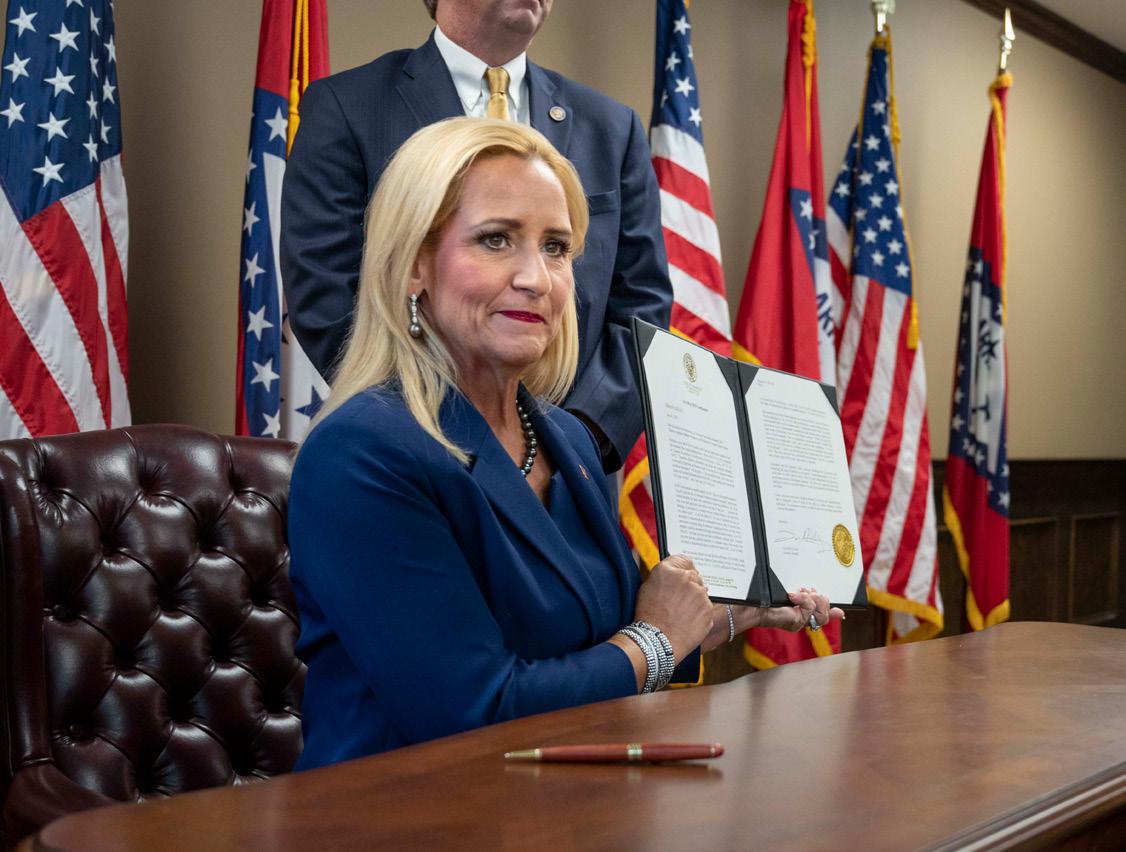
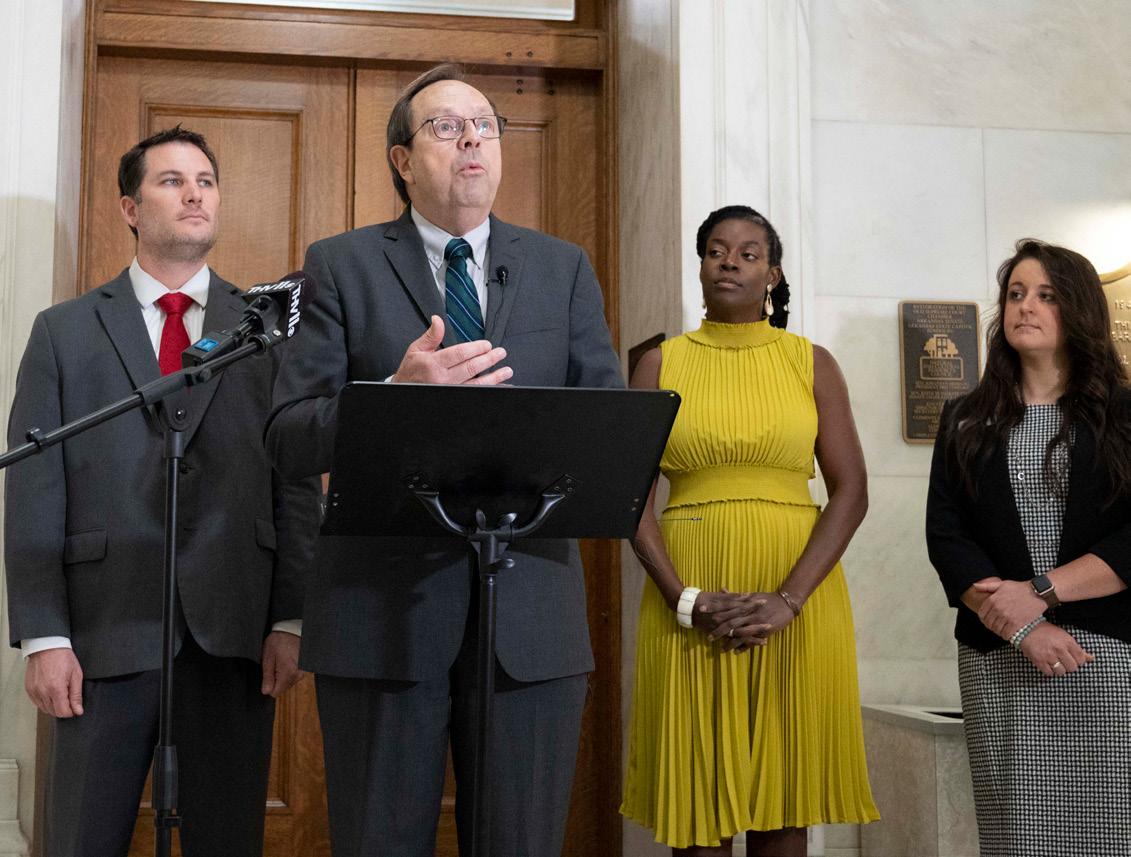
“I’VE
ME.”
—DR. JANET CATHEY

see women as mere vessels that are carrying something that doesn't belong to them, something that is somehow separate and independent. … They don’t respect or trust women, in my opinion. In many cases there's even a moral judgment about the fact that she was sexually active. And then there's just old-fashioned misogyny: wanting to control women they see as morally and intellectually inferior.”
So, how should women of child-bearing age prepare for health emergencies during pregnancy?
“First and foremost, if possible, move to a pro-choice state,” Sklar advised. “Other than that, save money and develop a plan.”
Meanwhile, Newbern said Arkansans must focus on electing pro-choice officials.
“That is the way we will turn the tide,” she said. “A majority of Arkansans do not believe politicians should be in charge of women’s bodily autonomy and right to self-determination. We will also need to have a successful ballot initiative to enshrine the right in our state constitution. The anti-abortion folks know that banning abortion is not a winning issue.”
Cathey said she hasn’t had threats over her work, but has “received letters telling me how evil I was or that Jesus could save me. I even got a text about killing babies.
“I’ve had dreams about people standing in front of my house threatening me. But I have never been afraid.”
Sklar, 64, was doing some genealogical research on her family when she came upon a coroner’s report about the “suspicious death of a pregnant woman.” In the report, the coroner wrote that the mother of six or seven children had tried to get “respite” from her doctor — presumably an abortion — but was turned away. She then sought the help of an unlicensed health practitioner of “ill repute” and soon died of hemorrhaging and sepsis. “It was interesting because it seemed to me the coroner was suggesting that the woman should have been able to get an abortion to avoid this tragedy. It was disturbing to read, to say the least,” Sklar said.
As for Brownstein, she’s trying to live by the Golden Rule. “I don't worry about whether there is a god or not, but personally I don't think there is one,” she said. “If there were, why would she let some 10-year-old girl be raped by a family member and then denied an abortion?”
For now, though, Brownstein suggested young women “prepare by stocking up on medical abortion drugs somehow and/or making plans to travel to other free states.” She noted women also can get assistance from the Arkansas Abortion Support Network.
In any event, the abortion wars aren’t likely to end soon. “I suspect this fight will go on at least for the duration of my lifetime, and several more generations, unfortunately,” Brownstein said.
ARKANSAS RANKS LAST IN THE NATION FOR DENTAL HEALTH. SO FAR, FIXING THE PROBLEM IS ABOUT AS EASY AS PULLING TEETH.
STORY AND PHOTOGRAPHY BY STEPHANIE SMITTLE
At 6:04
a.m. on a chilly Friday in April, Katheryn Newton was standing outside the Conway Expo Center, near the front of a long line that snaked around the building’s exterior. She and a friend, Michelle Conrad, had driven to Conway from Bradford (White County) the night before so they could arrive early for Mission of Mercy, an annual, two-day free dental clinic. A friend fronted them money for gas. When they arrived at 5 a.m., “there were already umpteen people in line ahead of us,” Conrad said.
By the time the sun came up, the line was hundreds of people deep. Some had toted camp chairs along for the wait. When the women returned for follow-up care the second day of the clinic, they arrived at 2:30 a.m. and still weren’t first in line.
Newton, a 48-year-old native of Bradford, had nine teeth pulled that weekend. She’s been sober for 14 years, but a history of addiction and lack of routine medical care had left her teeth in shambles.
“The loose teeth were a big problem,” she said, “because I couldn’t eat anything but soup. I lost 20 pounds in about a month, eating nothing but soup.
“The pain was off the charts,” Newton said. “Over the top on the pain.”
Like its national parent organization, the Arkansas chapter of Mission of Mercy is faith-based; its logo is an angel in ascent over an outline of the state, and its longtime executive director, dentist Terry Fiddler, described his devotion to the volunteer effort this way: “I fully believe that God put every one of us on Earth to help others.”
After nearly two decades of operation, the clinic is a well-oiled machine. On the day we visited, Fiddler directed traffic in the expo center over a microphone as volunteer dentists hovered over patients lying supine on portable exam tables. Administrators and support staff screened incoming patients in a triage area and buzzed between work stations designated by large banners that read “RESTORATIVE,” “SURGERY,” “PARTIALS.” Dental tools whirred, autoclaves sanitized used equipment, and tables of meticulously organized medical supplies — cotton pellets, crown cement, masks — were at the ready on folding tables and on rolling carts. “Uptown Funk” played from a small boombox up front, mirroring the focused energy elsewhere in the event hall. I asked Fiddler what’s kept him doing this for so long. “They got me at the right price,” he said. “Zero dollars.”
“A hygienist or a layperson that knows computer skills,” Fiddler announced calmly over the sound system, “we need somebody to help us in X-ray. If you're a dental assistant and you work in X-rays and you don't have a place to be, we need you now.”
By the time the 2024 session ended, volunteers had worked on 2,290 patients and performed roughly 6,000 extractions.
Arkansas consistently ranks last or near-last in national surveys of oral health. The Arkansas Department of Health’s Office of Oral Health reported that in 2018, only 56.1% of Arkansas adults visited the dentist in the previous 12 months, well below the national average of 67.6%. The percentage of adult Arkansans who have had permanent teeth extracted was 51% in 2018, while the national average was 41%. The percentage of Arkansans over 65 with no natural teeth left was 21.6% in 2018; the national average was 13.6%.

The statistics echo a refrain heard elsewhere in the medical community: It’s low-income and food-insecure households that are in the most need of urgent dental care. The Office of Oral Health reported in a 2022 behavioral risk study that 62.5% of adult Arkansans from households making less than $15,000/year have had permanent teeth extracted, as opposed to 37.3% from households making $50,000 or more a year.
Dental health affects (and reflects) overall health more than you might imagine. The mouth is the gateway to both the respiratory and digestive systems, and infections that begin in the mouth can spread to other parts of the body. Chronic oral pain can affect a person’s ability to chew, swallow or even speak. In pregnant people, the Mayo Clinic reported, periodontitis has been linked to premature birth and low birth weight. A number of cancers have been linked to gum disease, and conditions like diabetes or HIV/AIDS can impact the body’s ability to fight off an oral infection. In 2018, only 48% of adult Arkansans with diabetes had visited a dentist in the last 12 months, compared to the national average of 60%.
Disparities in dental health are not only socioeconomic, but racial and geographic. The Department of Health screened third-graders in 51 public schools in Arkansas in 2023. Among their findings: Hispanic children had the highest prevalence of tooth decay, and Black children had the lowest prevalence of dental sealants — protective coatings commonly applied to back molar teeth to prevent
cavities. In that same screening, children eligible for free or reduced-price meals through the National School Lunch Program had a higher prevalence of tooth decay than their classmates in higher-income households.
So how did we get here? Why is the state of dental health in Arkansas so consistently poor?
For starters, Arkansans are underinsured. A 2022 study from the Arkansas Center for Health Improvement reported that only 10% of Arkansans were without general health insurance in 2022, while a whopping 54% of Arkansans had no evidence of dental insurance in 2019. Like vision insurance, dental insurance is often treated as an optional “add-on.” Faced with health premiums that already make a significant dent in their paychecks, many Arkansans opt out of dental coverage.
But even Arkansans who are insured aren’t going to the dentist. While even the most devout dental patients paused visits to the dentist during the pandemic, the problem’s older than COVID-19; the Arkansas Center for Health Improvement reported in 2022 that only about one in three Arkansans age 19 or older with dental insurance used any dental services in 2019.
If you ask Billy Tarpley, longtime executive director of the Arkansas State Dental Association, “a great deal of this is cultural. Many Arkansans aren’t raised in a household that values oral health,” and don’t visit the dentist regularly regardless of how or whether they’re insured. “They go to the dentist when they’re in pain,” Tarpley said, “which, quite frankly, is the way I was raised.”
One of the chief reasons we’re not seeing Arkansans at the dentist’s office? They’re going to the emergency room instead. “A significant number of people go to the emergency room for conditions that could have been treated in a dental office,” Tarpley said. Severe pain or bleeding from untreated decay may drive someone to seek emergency care, or they may experience trouble breathing or swallowing due to an untreated dental abscess.
“There are people who use the ER as their health care system. … ERs aren't designed to do dental care. They don't have a dentist,” Tarpley said.
Health experts cite another contributing factor to the state’s poor oral health: low dentist-to-population ratios. A state Department of Health review of the geographic distribution of dentists indicated that in 2019, six Arkansas counties — Calhoun, Cleveland, Lafayette, Newton, Nevada and Perry — did not have a permanent address for a dentist’s office at all. Thirteen additional counties had less than one dentist per 2,000 residents.
Compared to the national average of 61 dentists per 100,000 residents, Arkansas has a staggeringly low ratio of 42 per 100,000. That maldistribution can make it difficult for rural residents, especially ones already under financial strain, to travel to the nearest dentist’s office that accepts
their insurance.
There might be room for some optimism. Batesville-based Lyon College plans to open the state’s first dental school in Little Rock’s Riverdale neighborhood, with plans to enroll its inaugural class in the summer of 2025. Out-of-state students aren’t charged a higher rate for the three-year, nine-trimester program, and the hope is that both Arkansans and students from elsewhere will stay in Arkansas once they graduate.
Whether they will set up shop in rural areas is unclear. “It's hard to attract a dentist who comes out of school with $350,000 in student debt and say, ‘Hey, we want you to go down to the Delta, or we want you to go to another part of the state where there aren't many people,’” Tarpley said. “That's just not a good sell.”
Other states offer debt-reduction programs for new dentists in underserved areas. Could Arkansas follow suit? “That's being done on the federal level,” Tarpley said. “It's never been done on the state level [in Arkansas]. We do it for physicians, but not for dentists.”
Arkansas dentists point to another reason more practitioners might not be setting up shop around here. They say they’re being squeezed when it comes to third-party billing — the way dental offices are compensated (or not) by public or private insurers for services provided.
On one hand, dentist pay in the United States is relatively high compared to other wealthy countries. The median pay for a dentist in the U.S. was $170,910 in 2023, according to the U.S. Bureau of Labor Statistics, and the median for Arkansas dentists was $168,760. Dentists, like other medical professionals, want that dental school tab to yield a high salary, and whether they’re paid fairly for the services they provide is a complicated question.
One consideration is the high overhead. Running a medical clinic of any kind is expensive, but dentists’ offices are a bit more like an operating room than a typical doctor’s exam room, which means they’re incredibly costly to build and maintain. That creates a financial crunch that hits rural dentists — and their patient populations — the hardest. The more remote a dentist’s office is, the more of their patient population is likely impacted by poverty and unemployment. That means patients are less likely to be covered by private insurance, which reimburses dentists at a higher rate than Medicaid, the largest publicly funded insurance program.
In turn, dentists say, they can’t make ends meet on Medicaid’s low reimbursement rates. The roughly 800,000 Arkansans with Medicaid dental insurance (including over 400,000 children) can have a hard time finding a dentist who will see them. Only 61% of the state's dentists accept Medicaid, according to information from the Winthrop Rockefeller Institute.
“What we're dealing with,” Tarpley said, “is a fee sched-
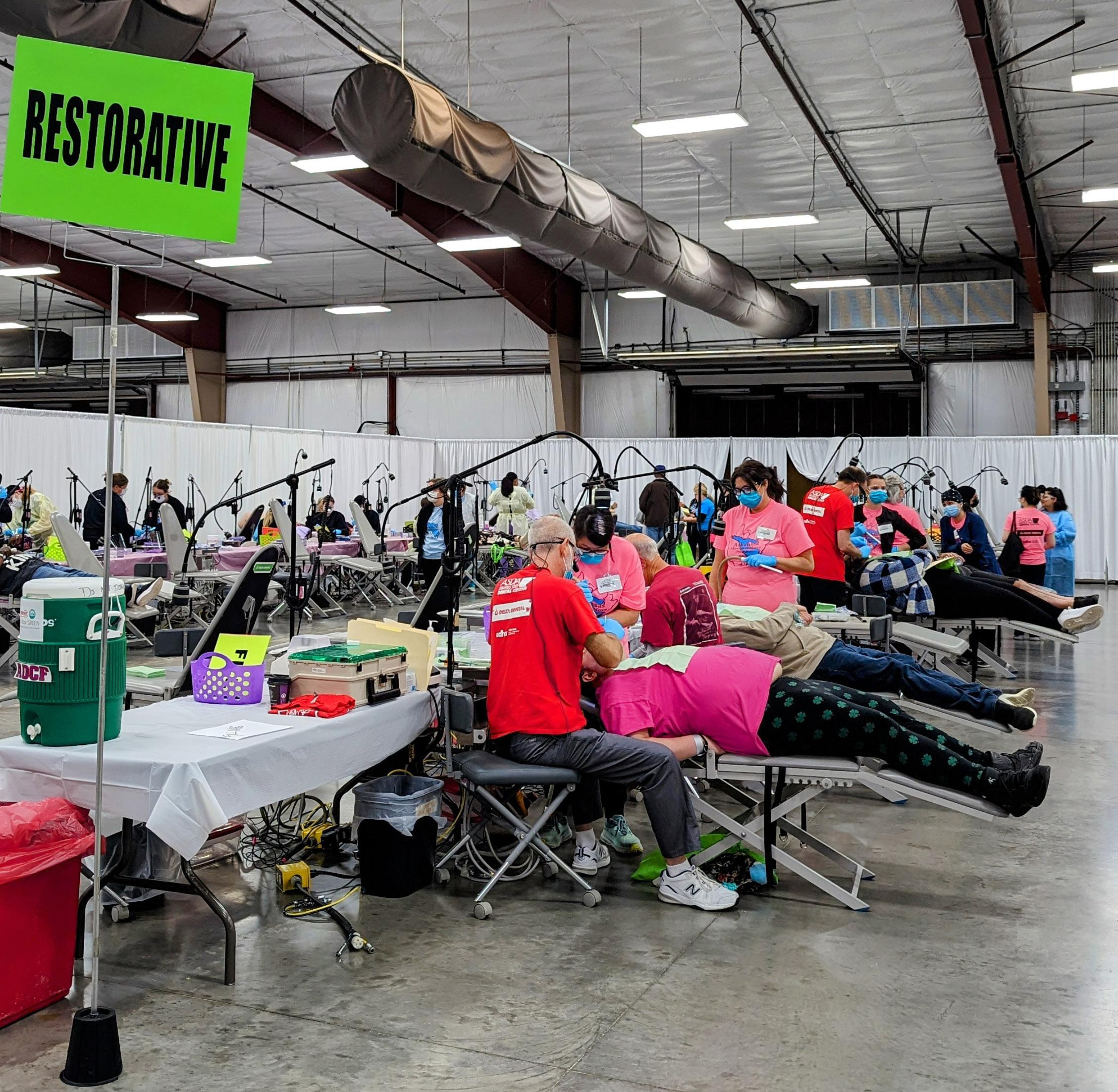
OPEN WIDE: Volunteers at the 2024 Mission of Mercy pop-up clinic performed roughly 6,000 extractions over the course of two days.
THE PERCENTAGE OF ARKANSANS OVER 65 WITH NO NATURAL TEETH LEFT WAS 21.6% IN 2018; THE NATIONAL AVERAGE WAS 13.6%.

The Arkansas Dental Association, in a 2022 survey of dentists who accept Medicaid, reported that 84% of them would drop the program by 2025 if reimbursement rates aren’t increased.
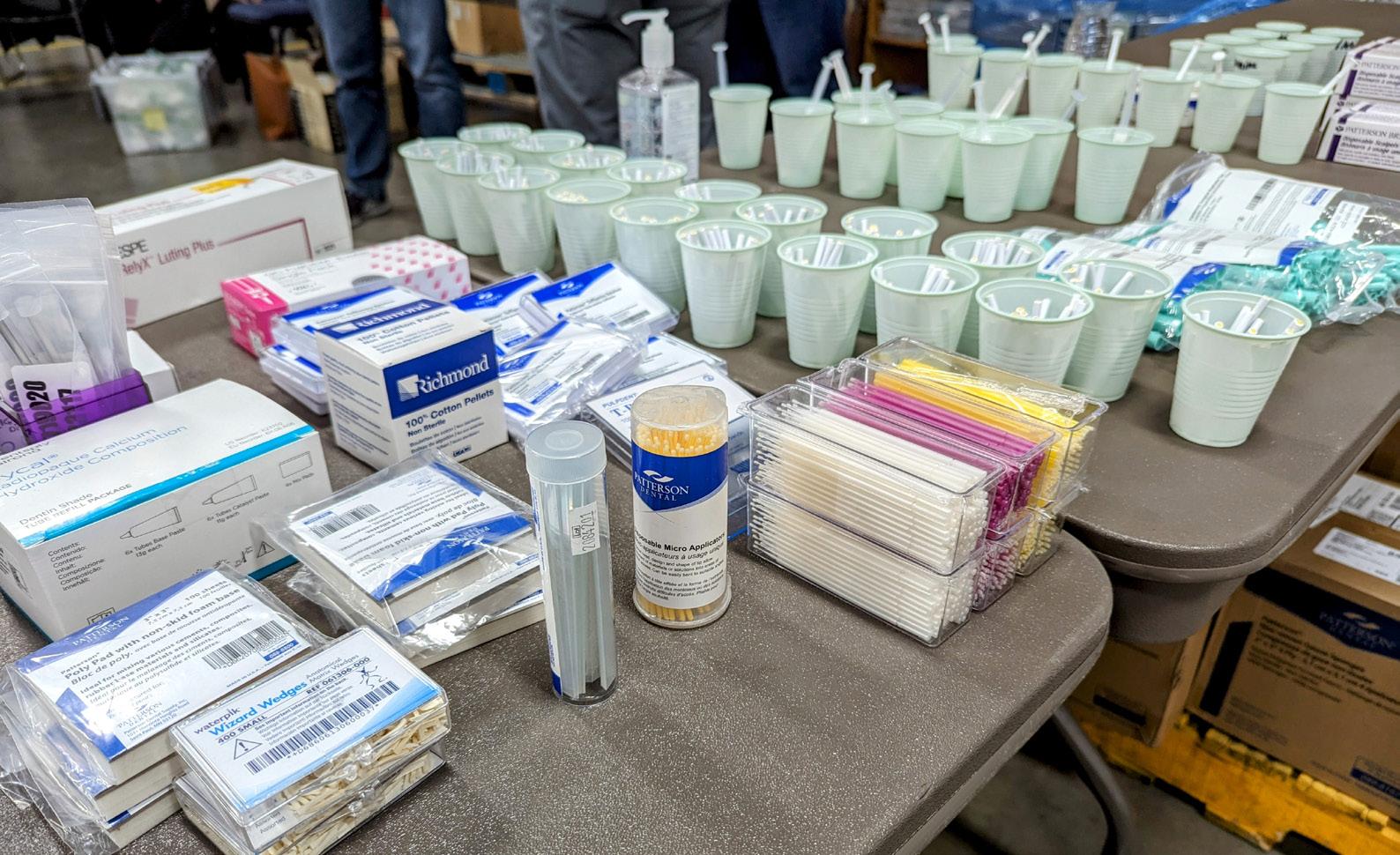
DENTISTS SAY THEY CAN’T MAKE ENDS MEET ON MEDICAID’S LOW REIMBURSEMENT RATES.
ule for Medicaid patients that hasn't been increased in 16 years.”
Then there’s the paperwork. Health policy advocates say that while higher Medicaid reimbursement rates have been linked with greater use of dental services in some states, simplifying administrative requirements could make those increases even more effective.
ARKids, the Medicaid-funded insurance program that covers the majority of children in Arkansas, pays for most medically necessary dental services, with some requiring a small co-pay. That’s not the case for adults. For people over 18, Medicaid caps its dental coverage at $500 per fiscal year, as did the managed care program. While some procedures do not count toward the $500 allotment — annual cleanings, X-rays, extractions and a once-per-lifetime set of dentures — it can be spent swiftly if a patient needs more care. Once that $500 is maxed out, the burden shifts to the patient to figure out how to pay.
That leaves many people with few options. They can apply for financial assistance from organizations like the Denver-based nonprofit Dental Lifeline Network so long as the care is deemed “medically necessary,” and if they live in the one-third of Arkansas counties that are eligible. They can, as Newton did, seek out charitable dentistry programs like Mission of Mercy, where dentists or dental hygienists are enlisted as volunteers to offer pop-up care for a short window of time. Other programs, like the dental education wing at University of Arkansas for Medical Sciences, focus on preventative care, offering dental exams from its medical student ranks for $40 a visit. Some providers, like College Station Clinic in southeast Little Rock, offer dental care with a sliding scale co-pay based on a patient’s income.
The state has made a major change in the way that Medicaid pays dentists in recent months. Beginning in 2018, the Arkansas Department of Human Services (DHS) used a “managed care” model, meaning it contracted with private insurers and sent dental claims through those companies. As of November, it has switched to a “fee for service” model, meaning that dental providers bill Medicaid directly. When recipients report to the dentist now, they check in at the front desk with their Medicaid ID, not an MCNA or Delta Dental card from a middleman private insurer.
The shift from managed care to a fee-for-service model for Medicaid may not be felt suddenly or tangibly from the patient’s perspective. The DHS told us that “the vast majority of services are covered as they were under managed care,” and that claims data showed that less than 5% of adult Medicaid beneficiaries exceeded their $500 annual allotment.
But cutting private insurers out from between the state and dental providers “definitely moves the needle for the dentist,” Tarpley said, because it’s rekindling a long-smoldering conversation about how dentists are paid.
The big question is ultimately whether the state will raise rates. “The state has to do its job to provide a fee schedule that's appropriate and consistent with the rising cost of dental supplies and how we pay dental auxiliaries and the dentist to
keep up with their overhead,” Tarpley said.
The Arkansas Dental Association, in a 2022 survey of dentists who accept Medicaid, reported that 84% of them would drop the program by 2025 if rates aren’t increased. “We continue to work with DHS now,” Tarpley said, in a long-awaited review of the Medicaid fee schedule. “The last three proposals we made to them were simply ignored, and we were told, ‘There's just not the money available to do that.’ And we know the money's available to do it; they just had to dedicate it. So we're trying really, really hard to avoid a crisis situation.” For now, at least, the line is open.
The review, a representative from DHS told us, “will include rates, covered procedure codes, provider authorization requirements, billing rules, and service limits, as well as a full revision of our provider manual. The rate review process and the provider manual revision process will be handled in two separate, but parallel tracks, with the goal of implementation by June 2025.”
Alongside a change to the Medicaid fee schedule, there are other changes dental health advocates would like to see:
Less headache and red tape for dentists when billing insurance, whether through Medicaid or private companies. A statewide initiative educating new moms on how to care for their infant’s developing teeth, for one, or regular access to on-campus dental screenings at public schools. State-funded grants, loans and tax incentives for “safety-net” dental clinics that provide free or low-cost care to rural and low-income communities, and for dental school grads relocating to areas of Arkansas with high rates of poverty and unemployment. Education initiatives on tobacco cessation. An increase in the number of schools eligible for the Seal-the-State program, in which cavity-preventing dental sealants can be applied to children's developing molars.
One hot-button topic is water fluoridation. Arkansas began requiring municipal water systems above a certain size to add fluoride to drinking water in 2011, and the state has seen one of the largest increases in the nation in fluoridation rates since then. In January 2023, the nonprofit Arkansas Oral Health Coalition reported that 86% of Arkansans now benefit from “optimally fluoridated” drinking water. But four Republican state legislators introduced a bill in November that would repeal the 2011 bill and end the state program, threatening to reverse those gains.
Dental health advocates also recommend paying more attention to the broader economic factors that contribute to poor oral health for low-income Arkansans: low wages, lack of access to healthy food, barriers to staying on the Medicaid rolls, lack of public transportation for dental visits and lack of broadband internet for telehealth appointments.
How (and how soon) any proposed changes will affect people like Katheryn Newton is unclear. For now, her plans are to be back at the Mission of Mercy clinic in 2025, and to seek out a set of dentures after her remaining teeth are extracted.
“It would boost my confidence,” Newton told us, “because I don't like smiling with, you know, the rotten teeth in my mouth. You don't feel good about yourself that way.”

THE MAKING OF A MODERN RECORD LABEL.
BY DANIEL FORD
PROGRESSIVE FOLK: Kurt DeLashmet co-founded Gar Hole Records in 2020. The Fayetteville-based label is known for a unique blend of progressive politics, traditional music and a design aesthetic that borrows from much heavier music scenes.
Gar Hole-idays 2024, the annual weekend-long winter showcase for Fayetteville-based label Gar Hole Records, began in December at the American Legion Post 27 with Santa Claus and a camo-clad woman waltzing to one of the label’s newest additions, New Orleans singer-songwriter Maddy Kirgo, and her band’s country-tinged dream pop. It ended in the packed back room of George’s Majestic Lounge, with label co-founder Nick Shoulders and more than a dozen other Gar Hole musicians leading a rousing rendition of the Rolling Stones classic “Dead Flowers.”

The event was a microcosm of the label itself: able to occupy both nontraditional, DIY spaces like the cinderblock-walled, dinky chandelier-lit hall at a veterans advocacy clubhouse and a historic music venue like George’s without sacrificing any of its distinct personality. That personality — a unique blend of progressive politics, traditional music and a design aesthetic that borrows from much heavier music scenes — has cultivated a fervent fan base for not only the diverse roster of Gar Hole artists, but also for the label itself. That’s an increasingly rare occurrence in today’s highly dispersed and digitized music world.
“I think a kind of special thing about Gar Hole is that it’s acting more like the way an older label used to,” Fayetteville-based country musician and Gar Hole artist Dylan Earl said. “When people used to follow a label and say ‘Cool, I’m gonna buy whatever release comes out on that without even hearing it.’ Kids are rocking Gar Hole really hard and, damn, maybe this is kind of how that used to work.”
This type of loyalty is not an overnight



HIGH-RANKING: New Orleans singersongwriter Chris Acker performs at the third annual Gar Hole-idays Winter Showcase. Paste Magazine listed his recent Gar Hole release, “Famous Lunch,” as the 78th best album of 2024.

“IT'S JUST A TRUE DIY,

phenomenon. Gar Hole Records is now in its fifth year of hard-won existence, the product of label co-founders Kurt DeLashmet — who runs much of the day-to-day operations after learning the ropes of the business through his cassette label (and sister label to Gar Hole) Tape Dad — and Shoulders, the selfproclaimed “un-Americana” artist whose viral rise during the pandemic served as a launching pad for the label.
DeLashmet released Shoulders’ first album, “Okay, Crawdad,” on cassette through Tape Dad in 2019, and when Shoulders moved back to Fayetteville from New Orleans, the two decided to try their hand at forming a record label.
“No one really knew what to expect, but we decided to take the reins ourselves,” DeLashmet said. “Instead of funneling things through Tape Dad, we just decided to start a different project that would be a little more focused on a specific genre-world of music.”
Pinpointing that world can be a little difficult. The label’s website captures its overall house style in poetic terms: “If you’ve ever been to a place where failure is assured, hardship is welcomed, and the water’s never quite clear: you’ve been to the Gar Hole.” In more concrete language, a typical Gar Hole signee lives somewhere along the intersection of Americana, roots music, country and folk, with each artist putting a unique spin on these more traditional genres.
“If you were to get down to the very core of what we like to look for, it is just really good songwriting,” DeLashmet said. “A voice that doesn’t shy away from that person’s personality. We want to hear something real.”
While DeLashmet, a self-described “early ’00s metalcore teenager” who doesn’t necessarily consider himself a country music fan, might be an unlikely person to run a label like Gar Hole, he and Shoulders have proven to have a sharp ear for talent, building out a roster of musicians who put out consistently quality records that receive local and national acclaim.
Paste Magazine listed four Gar Hole releases (albums by Bonnie Montgomery, Dylan Earl, Jude Brothers and Nick Shoulders) among its Top 30 Country, Folk and Americana Albums of 2023. The same magazine recently listed Gar Hole singer-songwriter Chris Acker’s album “Famous Lunch” as the 78th best album of 2024, regardless of genre.
Acker, who looks like a young David Crosby but whose voice and songwriting is more reminiscent of John Prine, is a representative of Gar Hole’s New Orleans contingent of artists, an enduring connection that's sprung from Shoulders’ time spent living in the city. It encapsulates part of Gar Hole’s efforts to exist on a national scale.
“I hope that Arkansas continues to grow its reputation as a place that is and always
has produced music that deserves to be paid attention to,” DeLashmet said, “but Gar Hole definitely strives to exist well beyond the borders of Arkansas.”
The business realities of a place like Arkansas complicate the label’s relationship with its home state, especially as compared to more common arts hubs in the South like Nashville, Tennessee, or Austin, Texas.
“I think Gar Hole has become synonymous with Arkansas in a sense, and it’s really amazing to be able to champion Arkansas music in this way because it doesn’t get championed super often and I take that very seriously,” DeLashmet said. But with his core focus being “helping these artists continue to move forward,” DeLashmet doesn’t believe that tying the label’s identity exclusively to Arkansas is the best way to return value to the artists.
In addition to yodeler extraordinaire Shoulders, there is a large and talented Arkansas contingent of artists: ambient Americana musician Austin Cash, vocal powerhouse Montgomery, deep crooner Earl, Northwest Arkansas folk musician Jess Harp and ethereal singer-songwriter Jude Brothers, who often accompanies themselves with a Celtic harp. Rivaling the Arkansas group in number is a growing group of New Orleans-based artists, including Kirgo, Acker and Americana group The Lostines, which traffics in a beguiling blend of roots music, doo wop and ’50s girl group harmonies. The rest of the roster comes from all over the map — cosmic country musician Desiree Cannon and folk duo Two Runner both hail from Northern California and folk/queergrass artist Creekbed Carter Hogan (whose album “Creekbed Carter” is my favorite 2024 Gar Hole release) is from Austin.
DeLashmet and Shoulders signed four of those artists in 2024. Including albums by sister label Tape Dad, Gar Hole put out 10 releases that year, reflecting a dizzying rate of growth for the still-young label.
“Spring of 2024 was a very busy spring, hopefully the busiest spring we ever have,” DeLashmet said. “We gotta slow it down next year.”
Digital streaming and social media continue to disrupt record labels’ ability to build artists’ careers in the traditional ways. Like any record label, Gar Hole struggles at times with how to best amplify its artists and make them stand out in an incredibly crowded music landscape.
“The hardest thing is promotion, which I wouldn’t pretend like I have figured out at this point,” DeLashmet said. “It sucks, it’s a really shit landscape for promoting music because a lot of the time it means it’s trying to convince an artist to do stuff that’s not making music or playing songs.”
The solution, in the absence of more


traditional PR and a music blogosphere that has largely cratered in recent years, has been to encourage and invest in its artists’ own social media presence. “People want to hear the artist’s perspective directly, so oftentimes the most compelling place to invest is really the platforms that represent the artist the best,” DeLashmet explained.
In the eyes of its artists, whatever Gar Hole is doing, which in addition to promotion includes working with outside vendors to manufacture all physical media and distribute both the physical and digital finished product, seems to be working.
“I’m so glad I didn’t get picked up and I was around long enough for Gar Hole to come into existence because I feel so at home,” Earl said. “It’s been wonderful because the name of the label has definitely gotten my music out into certain spots in certain places that I didn’t expect.”
Sam Doores, a New Orleans Americana mainstay who’s a member of the Lostines and
Three


countless other bands (he performed with four groups during Gar Hole-idays alone), summarized the label’s appeal: “I feel like Gar Hole is a very special label. I think it’s just a true DIY, for-the-love-of-the-music label, very artist-friendly.”
“Working with Gar Hole has been really special because it felt like a partnership not just between me and Kurt working on my record, but between all of the artists. We’re a tight-knit roster,” added Creekbed Carter Hogan. “I feel really lucky and proud and honored to be a geographical anomaly at Gar Hole.”
Dollar Country, a DJ who spun old country records between Gar Hole-idays sets, echoed that sentiment. “Every time I talked with an artist on the label they would tell me about how good a different person’s record was,” he posted on social media. “They were all so stoked on each other’s music it warmed my heart.”
This sense of community seems built at least in part around the concept of reclaiming southern culture and music from their conservative affiliations. Many Gar Hole artists unabashedly thread progressive politics through their traditional music forms. Shoulders released an a cappella single called “Apocalypse Never” in August to raise money for Palestine aid and Doctors Without Borders. Earl played “Outlaw Country” — an original song that bends its titular genre in an explicitly anti-fascist direction — at Gar Holeidays. Hogan’s “Sycamore” is a stunningly beautiful meditation on trans identity. In other words, Gar Hole seems to be fostering a much-needed dose of genuine human connection among its artists and fans, a medicine that could prove vital in turbulent times to come.
“This shit can feel so soulless, it can feel hard and lonely and isolating,” Hogan said. “And that’s the best part about being a Gar Hole artist. You’re all doing it together, you’re all trying together. And it’s not always pretty, but it is always important.”
“I believe that country music is a kind of a revolution,” Shoulders said toward the beginning of his headlining Gar Hole-idays set. Standing in a crowded room, side-by-side with hundreds of people who had traveled from far and wide to listen and sing and dance to a slew of Gar Hole artists and members of the label’s extended musical family, it was hard to disagree.


“You’re











BY RHETT BRINKLEY AND STEPHANIE SMITTLE
COLD? MEET COMFORT: A bowl of Fantastic China's chicken and corn velvet soup is portioned for two, but one can play at that game.


One of the most time-honored remedies for coping with the cold, gray and often bleak days immediately following the holidays — when we’re sick, tired and full of aspirational thinking — is to seek comfort from piping hot bowls of hearty broths, bisques and stews chockfull of vegetables, protein and noodles. And after a particularly deflating election year, some of us are looking for restorative pickme-ups wherever we can find them. Here’s a nonexhaustive list of some of our favorite local soups of the moment that have helped melt away our winter doldrums. Dine in or take ’em home, where you’ll get the added benefit of situating a steamy bowl on your lap for extra warmth.



Mr. Chen’s Authentic Chinese Cooking 3901 S. University Ave.
Tucked away near the entrance of an oriental supermarket on University and Asher avenues, Mr. Chen’s was one of the city’s best and most versatile Chinese restaurants (they’ve had hot pot burners on some of their tables for years!). Thanks to Instagram food blogger @southeats_asian, I was hip to the Szechuan beef stew on the noodle section of the menu. The portion is massive and the hearty beef stock is packed with what seemed like at least a half-pound of tender, stewed beef, along with bok choy, finely chopped vegetables and thick noodles cooked al dente. Just before going to press on this issue, we got word that the restaurant is closing to expand the supermarket. Let this entry be a tribute to one of the great Little Rock soup spots not enough of us took advantage of. RB



Nabeyaki Udon
Mt. Fuji
10301 N. Rodney Parham Road
Served in a cast iron bowl, the nabeyaki udon at Mt. Fuji looked commercial-worthy on a recent chilly December afternoon as a steady plume of delightfully aromatic steam rose from the savory broth, a picturesque warning that if you act too quickly, you’re liable to singe your tastebuds. The popular Japanese soup’s thick, pillowy udon noodles are accompanied by chunks of cabbage, fish cakes, green onion, a poached egg and a side of tempura shrimp and kakiage. RB
Chicken Andouille and Sausage Gumbo
The Oyster Bar
3003 W. Markham St.
One spoonful of The Oyster Bar’s andouille sausage gumbo on a gray afternoon in December almost made me feel like I was going to see snow on the ground when I looked out the window, reminiscent of a time when the Stifft Station restaurant was my neighborhood's snow day headquarters. Culture Editor Daniel Grear took a few bites and said, “Man, we should come here all the time.” Pro tip: Pair it with a side of the ridiculously flavorful manchego cheese grits and you have a perfect lunch for under $15. RB
Caldo de Pollo
Rosalinda’s
900 W. 35th St., North Little Rock
Honduran restaurant Rosalinda’s caldo de pollo was the invigorating punch I needed on a recent afternoon visit when I was feeling sluggish and unmotivated about returning to the office. A piping hot savory chicken broth with huge chunks of fork-tender carrots, cucumber, zucchini, a whole bone-in chicken thigh and drumstick was just what I needed. The soup is served with corn tortillas, a cup of rice and, if you’re wise, a pupusa of your liking on the side. RB
Kimchi Ramen
Gold Bowl
215 Center St.
Downtown needed a ramen spot, and it got one when Gold Bowl opened in the original Three Fold spot in the summer of 2023. The kimchi ramen with thinly sliced chashu pork belly; long, thin noodles; marinated egg; kikurage mushrooms (a mushroom native to Asia also known as wood ear); and chunks of kimchi has a salty umami flavor I keep coming back for. RB
Caldo de Res
Taqueria Karina Cafe
5309 W. 65th St.
Taqueira Karina has for years been a reliable source of authentic Mexican fare right next door to Tortilleria Brenda in a strip mall in Southwest Little Rock. Each Saturday they offer a popular caldo de res, and the tender beef, large chunks of corn on the cob, potatoes and carrots are great, but the broth itself is insane — fitting because caldo de res is Spanish for beef broth. I posted a picture of the soup to Instagram and a chef friend messaged me that the taqueria’s tortilla soup is his favorite dish in town. What are you waiting for? RB
Noodle Soup, Dumpling Soup or Beef
Noodle Soup
Three Fold
11525 Cantrell Road and 611 Main St.
It doesn’t matter if you decide on the noodle soup with a vegan sesame-based broth, the dumpling soup with a vegan soy-based broth or the beef noodle soup in a tomato-based beef broth, you’re making the right choice. Former Arkansas Times Editor Lindsey Millar called the Chinese restaurant’s beef noodle broth "deliciously complex” and recommends ordering it spicy so you sweat a little. “Like pho and homemade chicken noodle soup, it tastes like it has curative powers,” he wrote.
RB



3rd - Mike Dillon’s Punkadelic 4th - Jeff Coleman and the Feeders 10th - Jimmy Lynn’s Psychedelic Velocity 11th - Bluesboy Jag and Learning to Crawl 17th - TBA
18th - DeFrance
24th - TBA
25th - Starroy
31st - Yongi Live



Birria Ramen
Camp Taco
822 E. Sixth St.
The foundation for Camp Taco’s birria ramen is a spicy umami-flavored chili lime broth that comes with a vibrant purple slaw, al dente ramen noodles, chunks of avocado, fresh jalapeno slices, pickled carrots, braised beef and a soft-boiled egg. It's a deliciously spiced and unmistakably Instagrammable cold-weather comfort stew. Added bonus: There’s a vegan option that comes with zesty adobo mushrooms. RB
Sopa de Mariscos Hondureña
El Sur Street Food Co.
1214 Main St.
It's hard to venture away from your triedand-true order at El Sur; baleadas con todo have a way of making lifelong devotees out of SoMa visitors, and it’s hard for me to imagine walking in and *not* ordering a cauliflower chorizo arepa. But if a wintertime seafood soup could build a following, it might be this one. Floating in a golden coconut broth with tons of depth are chunks of corn on the cob, delicate mussels, scallops, yuca, cilantro, crab meat, green plantains and red snapper, with a side of steamed rice ready to make the most out of the sopa’s liquid assets. SS
Pho Tai
Mike's Café
5501 Asher Ave.
As a kid, it was always fun to eat food that changed as you ate it — the way an orange Push-Up popsicle would get creamier as it melted, or the way your morning Fruity Pebbles could transform a boring bowl of milk into a sweet artificial-rainbow nectar. Turns out, it's just as fun as an adult, letting thin slices of rare beef cook in a steamy broth over rice noodles, accented with lots of lime juice and Thai basil. Pro tip from General Manager (and social media fishing phenom) Tony Phan: Add lots of hoisin sauce. SS
Mì Hoành Thánh
Pho Thanh My
302 N. Shackleford Road
Ordering the wonton soup at Pho Thanh My might seem like ordering a cheeseburger at a rib joint, but hear us out. The unassuming Vietnamese soup diner on Shackleford has a long-lauded knack for creating a mysteriously complex but unobtrusive clear base, and it’s the unsung hero here, even as the toppings (sliced pork, shrimp, squid, crab meat, quail eggs) steal the limelight. Plus, the tender pork dumplings lurking below seems to slap even more when the temps dip below 40. Our tip: Skip the bean sprout accompaniments this time, lest they take over this delicate dance.






Dropping a to-go container of this on the doorstep of the friend who just came down with a cold? Good karma for the whole 2025 ride, for sure. SS
Chicken and Corn Velvet Soup
Fantastic China
1900 N. Grant St.
Behold the only thing that should ever keep you from ordering the crispy duck at Fantastic China: the aptly named chicken and corn velvet soup. Happily, this bowl refuses to answer the chicken-or-the-egg debate and lets them coexist in the same bowl, pairing ribbons of egg white with kernels of sweet corn and bits of deeply tenderized chicken, all bound together by what is surely a miracle of tradition and cornstarch. Bonus: It’s a safe bet for the spice-averse and comes with those irresistible crispy wonton chips. Viva velvet. SS
Chicken and Hearts of Palm Soup
Café Bossa Nova
2701 Kavanaugh Blvd.
Pretty sure if there were a Little Rockspecific Goldbelly service that shipped the city's hallmark delights around the country, this soup would be on the roster. Another dead giveaway of this creation’s popularity: the options to order a cup, a bowl, a pint or a quart. Derived from co-owner Rosalia Monroe’s recipe for chicken stroganoff, this delectable bowl is a masterful mix of shredded chicken breast, mushrooms and hearts of palm, cooked in a white wine sauce with garlic, onion, tomato and cream. How do you say, “On my death bed, please bring me this soup” in Portuguese? SS






‘OTHER’
BY MATT MCNAIR
As some of our loyal and learned readership has no doubt noticed, the past few years have seen a proliferation of cannabis products — or products purporting to be cannabis — available for purchase at gas stations and truck stops all across the state. Find these establishments most especially along stretches of highway dotted with towns too small to support large truck-stop outfits like Love’s and Flying J. I was not really aware of this phenomenon, but perhaps I shouldn’t have been quite so surprised. For years now, establishments that are definitely not smoke shops — namely, gas stations and truck stops and the like — have been carrying a wide array of smoking devices. Not just rolling papers or the occasional old-timey tobacco pipe, but glass-blown pipes with pretty patterns, larger versions that accommodate a little water in the chamber, and even big 2- and 3-foot glass pipes with multiple chambers and elaborate artistic flairs blown and embedded into the body and base of the device.
Bongs, in other words.
Not to belabor the before-times nostalgia, but I was hard-wired during a period of time when saying the word “bong” — or “pot,” “cannabis” or “marijuana,” for that matter — would see you promptly booted from the place selling the bongs, which were ostensibly not bongs, but “water pipes” for tobacco. All that stuff was illegal then, and the only way you could check out the cool paraphernalia was to studiously stick to the script.
DON'T MISS AN EPISODE.
I’m not sure why I never noticed that one could also buy decidedly non-tobacco products for these devices in the very same spot, but the fact that all of this glass started
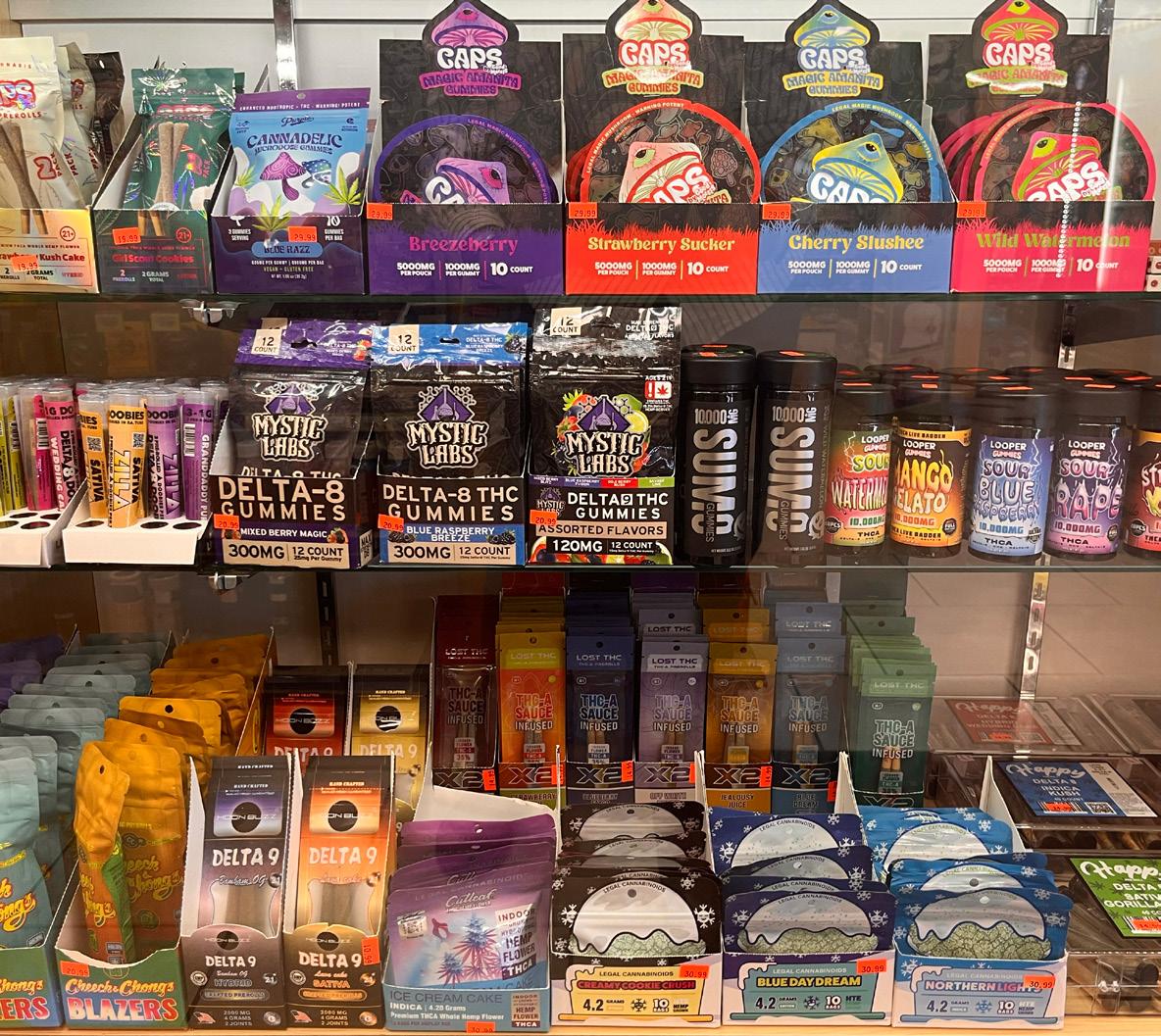
appearing in gas stations just as Arkansas was getting the rules for medical marijuana sorted out probably had a lot to do with it. In fact, there’s a good reason why Arkansas has an incredibly stringent and tightly enforced protocol regulating medical marijuana while also allowing a casual stroll into the local doob and lube to buy a pre-rolled blunt that is absolutely ground cannabis: the 2018 Farm Bill.
Marijuana has been illegal under federal law for decades. It has nonetheless been federal policy for several years now to allow individual states to decide on their own whether to permit marijuana use for that state’s citizens, be it for medical or recreational purposes. But while the federal government was taking a hands-off approach to marijuana and letting states do their laboratory-of-democracy thing, it was taking a more active role in rethinking the status of the cannabis plant. A pilot program mandated by the 2014 U.S. Farm Bill allowed for hemp cultivation for government research — including agricultural and industrial purposes — and the subsequent 2018 Farm Bill established the Domestic Hemp Production Program. That program essentially made the cultivation of hemp for agricultural and industrial purposes not only legal, but feasible for the first time in decades.
A couple of years ago, the Arkansas Legislature passed a bill to ban hemp-derived THC products, but the hemp folks challenged that in federal court. The judge initially agreed with the hemp industry plaintiffs that the ban should be put on hold while the case played out in court, meaning the hempderived THC products continued to be legal.
Marijuana, however, remained illegal. The federal government squared this circle by mandating any hemp produced under the new rules contain less than 0.3% Delta-9 tetrahydrocannabinol (THC) by dry weight. THC is the chemical compound in cannabis that produces psychoactive effects, and in turn makes the user high. Delta-9 is the most potent cannabinoid in cannabis, and also the only one — until fairly recently, at least — a layperson could name, or had ever even heard of.
As it turns out, Delta-9 THC, while the most potent cannabinol in a cannabis plant’s makeup, is not the only one, and other THC compounds — especially Delta-8 — will get a person plenty high, thank you very much. Thanks to the wording in that 2018 Farm Bill, so long as a cannabis plant’s Delta-9 makeup flies under that 0.3% dryweight threshold, as far as federal law is concerned it is cannabis but not marijuana, hemp but not weed. What regular folks have caught onto — value-added producers and card-less cannabis users alike — is that a cannabis plant sitting at <0.3% Delta-9 THC is indeed simultaneously marijuana and not, a stoner-friendly demonstration of simplified quantum theory.
I’ve never been a scientist and my marijuana days are closer to “lids” than “flower,” but I would offer that putting a match to Schrodinger’s Spliff will prove the cat was very, very high the entire time.
So what kinds of things can the astute truck-stop patron find for sale inside the station while the pump runs outside? Friend, the astute patron can find a lot.


APassionate Advocate for Health and Empowerment Wendye Walter, a trailblazer in the health and wellness industry, and she maintains an unwavering commitment to empowering individuals to make informed health decisions. As a proud U.S. Army Veteran, Wendye’s disciplined and resilient spirit has guided her journey from military service to becoming a leader in personalized health solutions. Recognizing the challenging environment that Americans are currently facing, Wendye emphasizes that now is the time to take charge of your health by choosing to assess, adapt, and act. With a deep passion for health, Wendye founded her company with the mission to bridge the gap between cutting-edge science and everyday wellness. She believes that knowledge is power, and that empowering individuals with personalized health data enables them to take charge of their well-being. Wendye’s initiatives, such as the Nutrition DNA test, reflect her dedication to providing accessible, customized health insights. Through her work, Wendye Walter continues to inspire and support countless individuals on their path to optimal health, making a lasting impact on the community by championing informed and empowered health decisions.







“EVEN THOUGH DELTA-8 CANNABIS PRODUCTS ARE REAL CANNABIS, THE FACT THAT THEY ARE BEING SOLD IN WHAT IS ESSENTIALLY A GRAY MARKET ... MAKES IT DIFFICULT TO KNOW WHAT YOU’RE GOING TO GET
Standard Delta-8 fare one can find in any number of gas stations, truck stops and smoke shops that sell such things. Distinguished by the ’80s synth-wave stylings on the physical package, and the overt physicality (read: sexuality) of the online marketing, which features a very attractive woman wearing a very aggressive outfit brandishing a Hi on Nature vape pen with the tagline “These F*ck” superimposed. 10/10, no notes.
Delta-8 producer seen more often in dedicated vape shops than behind gas station glass. Offers flower and mushroom-infused gummies as well as vape cartridges, pre-rolls and standard Delta-8 gummies.
Sorority chic cannabis company. I am staring at a Blazy Susan pre-rolled cone as I write this. Beautiful cone, perfect pink filter emblazoned with “Blazy Susan” in brand-appropriate script, all sealed in a nice translucent cylinder (it looks and feels like glass, but it’s plastic). Smells great. Not sure if the cannabis inside the cone is actually Blazy Susan. Based on the website, which is basically a lifestyle blog selling a mindboggling array of cute-grrrl-themed smoking accoutrements and cute hoodies, it would appear the answer is “no.”
Ignatius J. Reilly’s favorite flower? Perhaps. But whether fiction’s most famous spiral notebook aficionado would have appreciated the egalitarian thrill of purchasing a classylooking faux-wood-topped jar of loopholeexploiting cannabis (I’m guessing not, actually, as Reilly also ranks as one of fiction’s most annoying protagonists, a protoincel blowhard tailor-made to produce bad takes in dorm rooms from sea to shining sea who would no doubt be a) offended by the kind of gray-market chic epitomized by Big Chief Flower, b) too busy telling you that to smoke any Big Chief Flower, and c) scared of smoking Big Chief Flower in the first place.)
Big Chief Flower is also notable for being flower at all, as this particular market is dominated by gummies, pre-rolls and disposable vape pens.
Not to be confused with Arkan-RAW (a medical marijuana product sold in dispensaries) under any circumstance. Appears to be just a company that produces accessories, especially cones.
As is often the case with an idea or product mixed up in one of America’s myriad and ongoing moral panic foofaraws while being stubbornly profitable, cannabis-derived products are plagued by misconceptions and misunderstandings.
First and foremost among these misconceptions is that the cannabis available in truck stops, gas stations and other retail spaces not regulated by Arkansas’s medical marijuana law is “synthetic marijuana,” a dangerous, chemically derived synthetic drug sprayed on inert vegetable matter that became popular under marketing names such as “K2” and “Spice.” Those products are wholly derived from a chemical process and were sold with packaging marked “not for human consumption” in a ploy to deflect liability. These substances are not cannabis in any true sense of the word.
Maybe the misconception arises because hemp-derived products can undergo a chemical process to amp up the potency of their cannabinoids. But unlike K2 and Spice, they’re still cannabis.
The end result of the process, physically, is a viscous liquid that resists solidification, and is therefore best suited for use in edible products such as gummies. To produce Delta-8 flower, the Delta-8 distillate is sprayed onto cannabis fitting the legal sub0.3% Delta-9 THC definition of hemp. This is different from synthetic marijuana, which consists of a wholly chemical cannabinoid composition sprayed onto inert vegetable matter.
Even though Delta-8 cannabis products are real cannabis, the fact that they are being sold in what is essentially a gray market — with no federal or state oversight governing any valueadded processes applied to legal non-Delta 9 cannabis post-harvest — makes it difficult to know what you’re going to get from any given purchase. Unlike a dispensary, with state oversight of quality and health standards to go along with a professional and dedicated
staff, gas stations and truck stops only have to contract with a licensed distributor to get into the legal cannabis game. That means many widely marketed cannabis products are not subject to the quality control and inspection regime that governs medical marijuana.
There are a few other spots where you can buy hemp-derived THC products, including specialty hemp stores, restaurants that sell cannabis beverages and a North Little Rock brewery that sells its own brand of Delta-9 seltzer (Flyway Brewing).
Then there are the vape shops. The storefronts sprang up in abundance as electronic cigarettes gained popularity, and many have since made legal cannabis products a major part of their operations. While the THC products in vape shops are more or less the same as you’ll find in pretty much any other retail space, vape shops do have the advantage of being a specialty store with employees whose only job is directly related to cannabis. With independent vape shops, you have a fair chance of finding the owner-operator behind the counter. The proprietor of a shop dealing in products that have, deserved or no, an iffy reputation has a vested interest in running a tight ship and knowing their wares. That makes them more likely to have relevant advice about this or that product, and means they’ll certainly keep unsafe products such as banned synthetics out of their stores.
“That stuff? That stuff is trash,” said one such shopkeep when I brought up synthetics like K2. “That stuff could actually hurt you.”
“But all of this,” he continued, pointing to cannabis products of all types — edibles, vapes, flowers, pre-rolls — by the score, neatly stacked and arranged behind a dozen cases of pristine glass, “all this is good. It’s hemp. People want it. Not everybody can have a medical card. I’m providing a service.”
I buy a pre-roll (gotta do my due diligence, after all) and look around at the back of the store, noting an old recessed shelf and remembering that several years ago, before the Medical Marijuana Amendment and the Farm Bill and COVID-19 and ivermectin, this place used to be a liquor store.
The guy’s got a point.










Two months ago The Observer sank into my drafty spot at a corner desk in the Arkansas Times office after an hour of running around like a chicken with its head cut off (also known as reporting). Turning my attention to my inbox, I was accosted by an energetic editor with a new task for one of the Times’ go-getting journalists. The Gen-Z Observer was to take on the task of posting and babysitting the daily “Open Line” on arktimes.com.
For those of you unfamiliar with the Open Line, The Observer doesn’t blame you. A relic of the early days of the internet, this daily feature can be confusing to the younger set, baby Observer included. So I reached out to Max Brantley — former Times editor and impassioned Arkansas liberal icon — for some advice on what the hell this tradition was and how best to carry it on.
“I picked it up from other blogs that used it to good advantage,” Brantley said to my frantic email plea. “It was pretty robust in the early days. It was also a signal, absent some urgent news, that the reporting day was at an end.”
At first glance, publishing the daily Open Line seemed easy enough. I needed a cat or a nature picture, and a phrase like “Go!” or “How is everyone?” or “Happy Friday!” Then I just had to hit send promptly at 4 p.m. and it was done.
The Gen-Z Observer started paying more attention to the comment section under each daily post — the absolutely unhinged comment section. The place where anonymous liberals of Arkansas gather every afternoon to share articles, ask questions, criticize Donald Trump and Sarah Sanders, share weird comics/
aka old-fashioned memes, check in on one another, and angle for up-votes to be the top commenter of the day. Oh, and also to complain, like a lot. Including complaining about the production of the Open Line itself, especially when we’re tardy.
As a young Observer, I found myself transported to a side of the internet I never knew existed. Dozens of huge social platforms exist for news watchers who want to opine and gripe, but here they still are in 2025, our loyal Open Liners.
I had unknowingly become a steward of something much larger — and older — than I was. As the weeks of Open Line posting and comment sections filling up went by, I developed a strange connection to the two dozen or so chronic commenters and an understanding of the roles they play on the blog. I began seeing each Open Line as another chapter in the long story of the Arkansas Blog, and the commenters as the central characters with strong opinions, persistent disagreements and personal quirks. Each of them is just as essential as all of the reporters and editors who have been manning the blog since Brantley started it in 2004.
Some of those characters include StuA, a liberal protagonist of the blog who calls Trump “drumpf” in some kind of inside joke that I don’t understand and refers to Arkansas as “D’Arkansas,” which I understand a little better. His profile picture is Donald Trump looking at the eclipse without glasses. And then there’s Olphartus and George Orwell, two elder statesmen of the blog who combine leftism, cynicism and hick energy into a cosmopolitan of comments that’s hard for any conservative to swallow. Olphartus said the
main thing he’s accomplished on the Arkansas Blog is to “piss off some trolls.”
Commenters kate2014LR and Vanessa provide a little matronly love to the blog while bringing down fire and brimstone on Republicans and corporatists. LeRoyGunn, GreenHermit, imjustsaying, Tucker Max, Roger Head and many others complete the ranks of active Open Line soldiers. Then, of course, there is the Darth Vader of the blog, MAGA provocateur Steve Estrada, who is often in comment combat with StuA and George Orwell over various things in the national news on any given day. I did tattle to the editors on Estrada and get him in trouble for his liberal usage of slurs, so he hasn’t been around as much since then.
On Monday, Dec. 9, I asked the bloggers why they’ve stuck around so long. Why is the Open Line their chosen forum?
The Open Liner known as “Perplexed” responded first and said they’ve been commenting since around 2007, but haven’t been active lately because of election depression. They said they’ve stuck around because of the thoughtful conversations, and the deep sense of community they’ve fostered with the other bloggers. They were upvoted, and as the hours passed, the regular crowd appeared in the comment section to mourn the loss of eLwood, Tina, NVR, DBI and many others who made the blog special for them over the years. They even described attending eLwood’s funeral in Springdale together.
The Open Line won’t change the world, but it has certainly meant something to a whole lot of disaffected Arkansans. So, as weird as this vintage tradition might be, I’m honored to help it continue.




